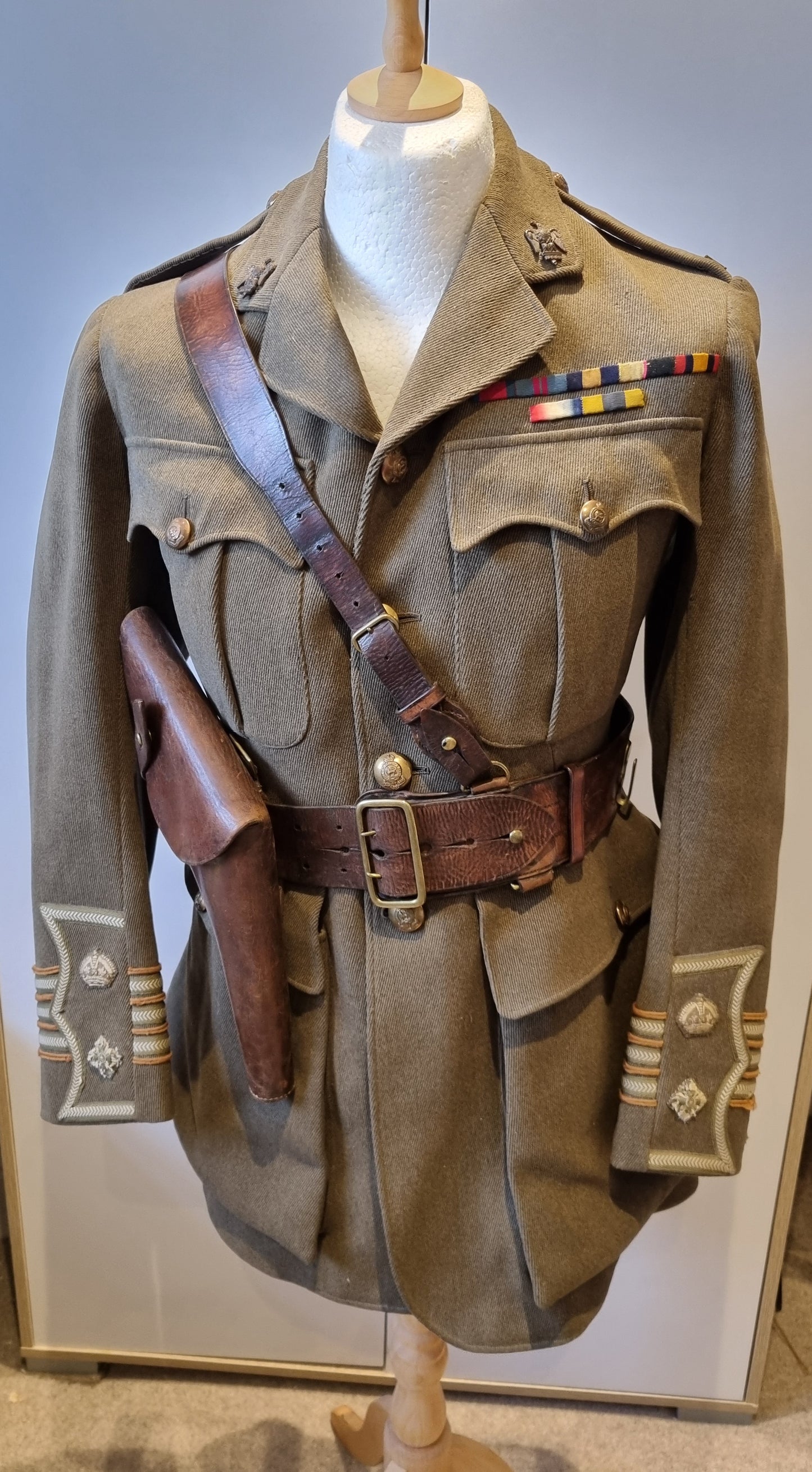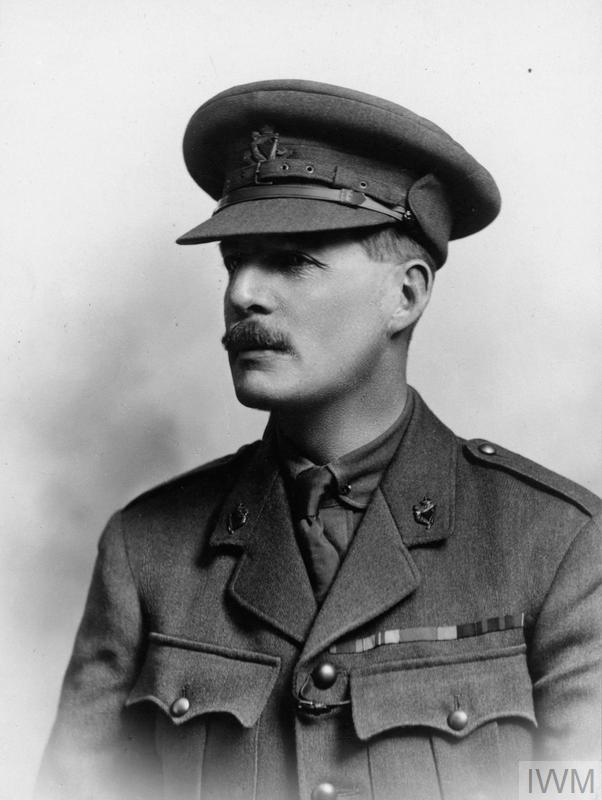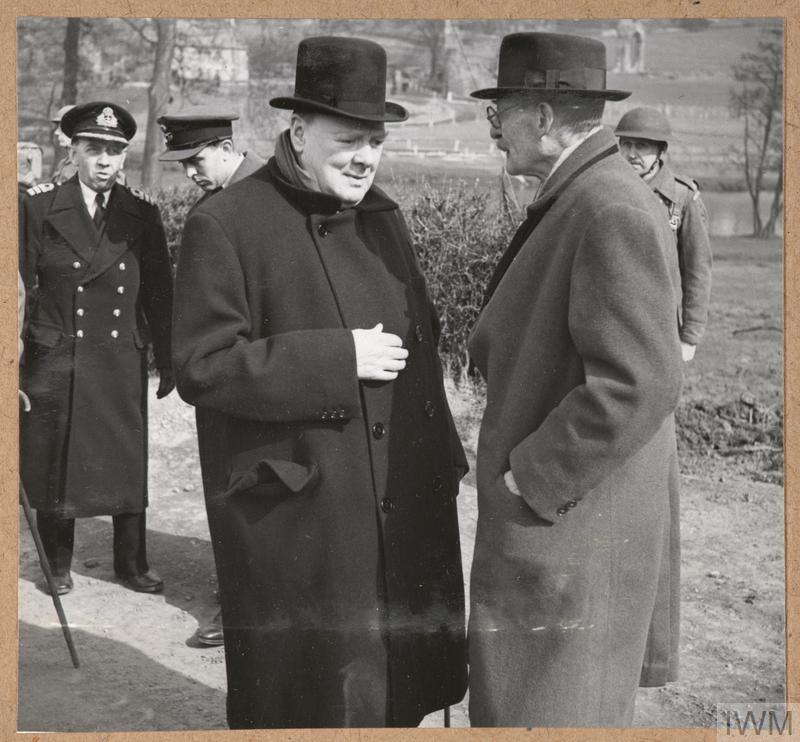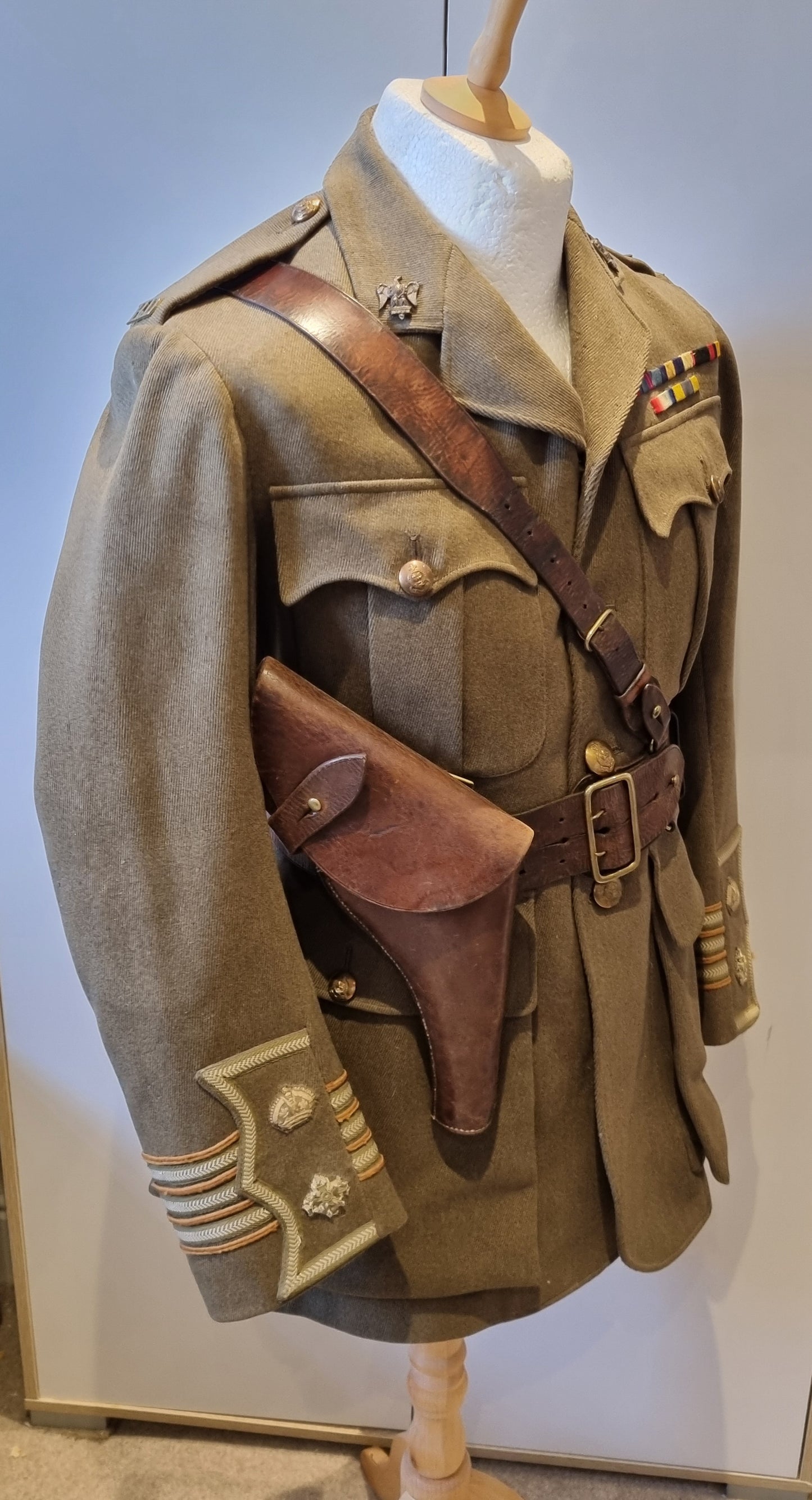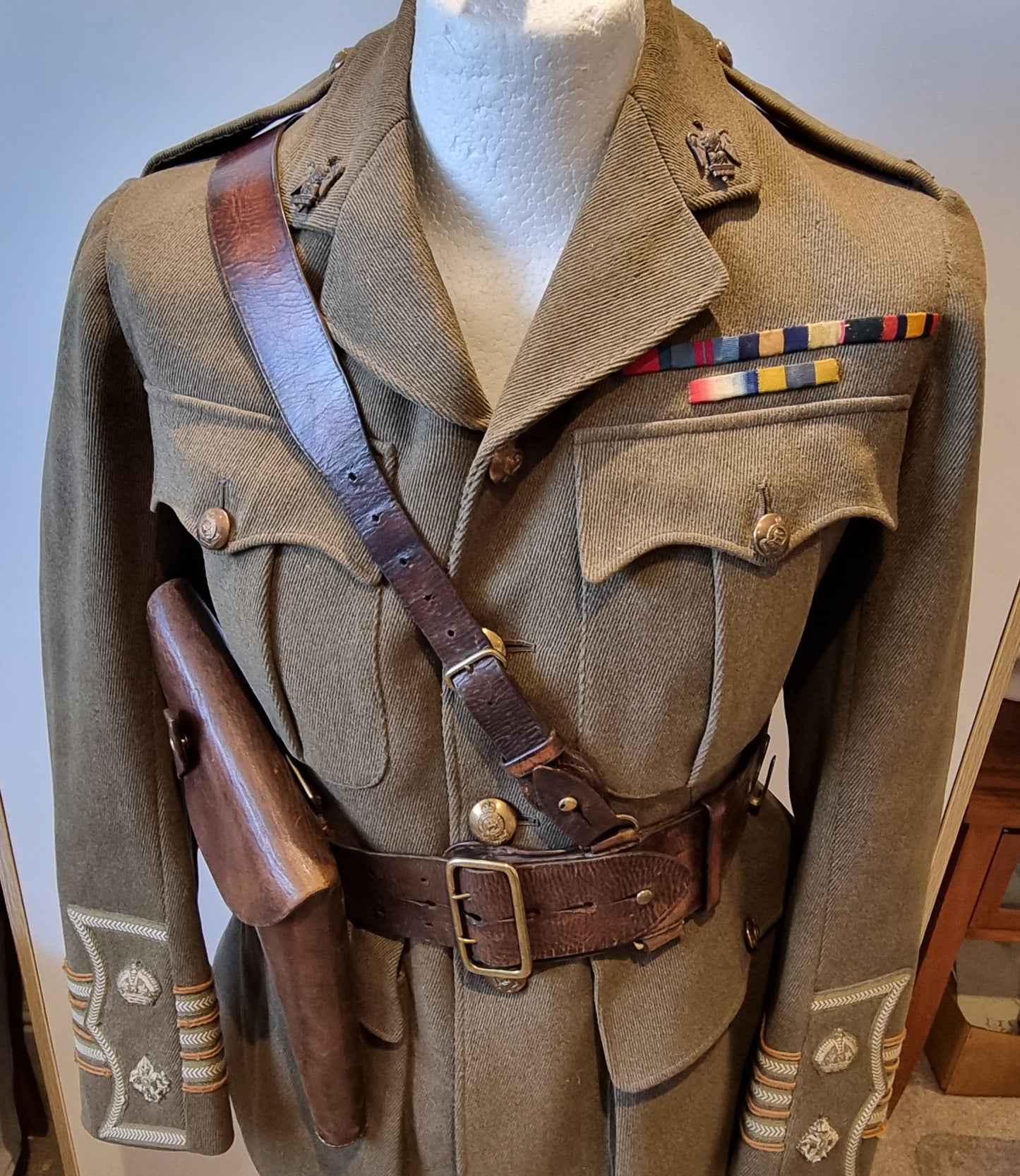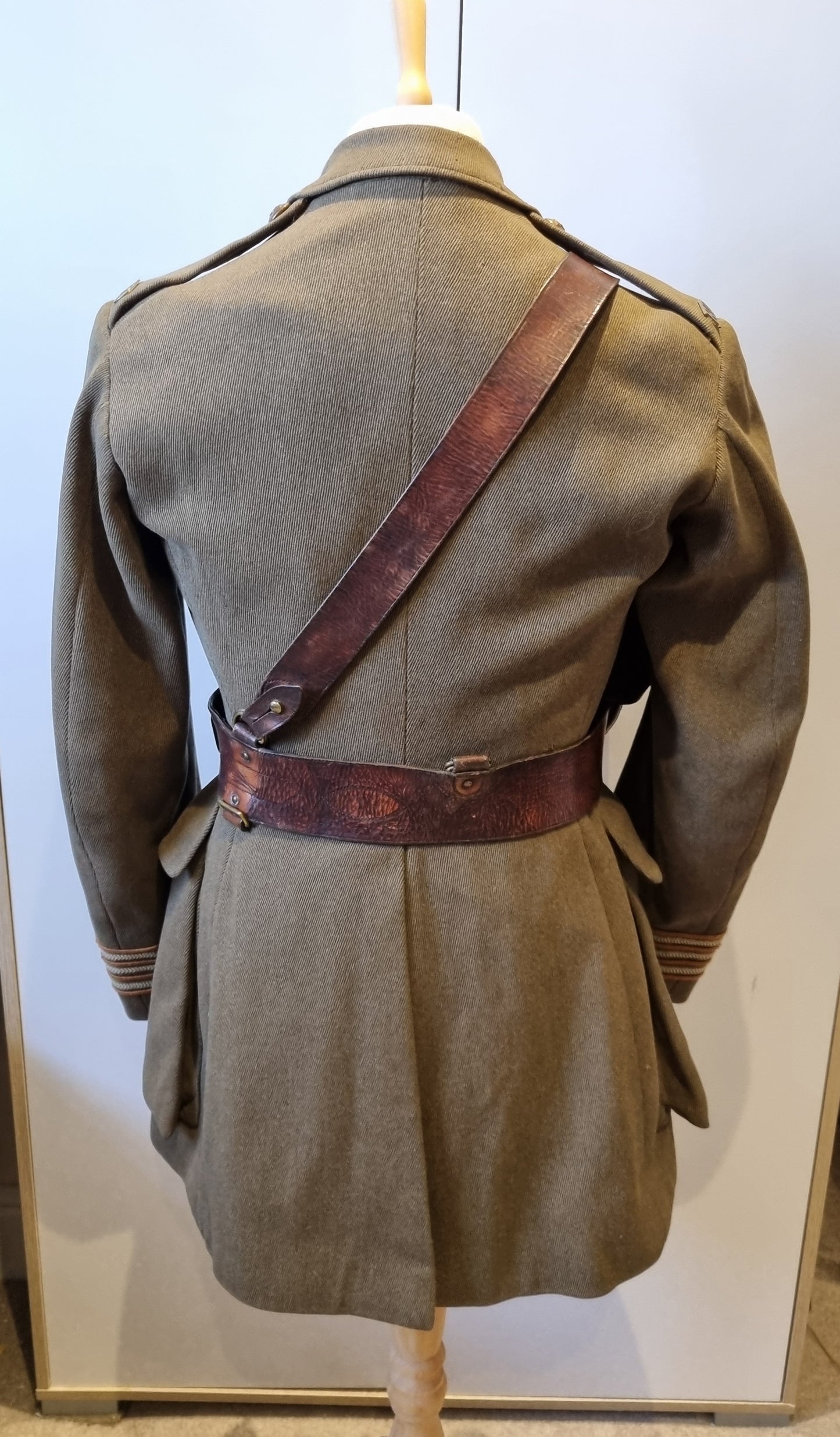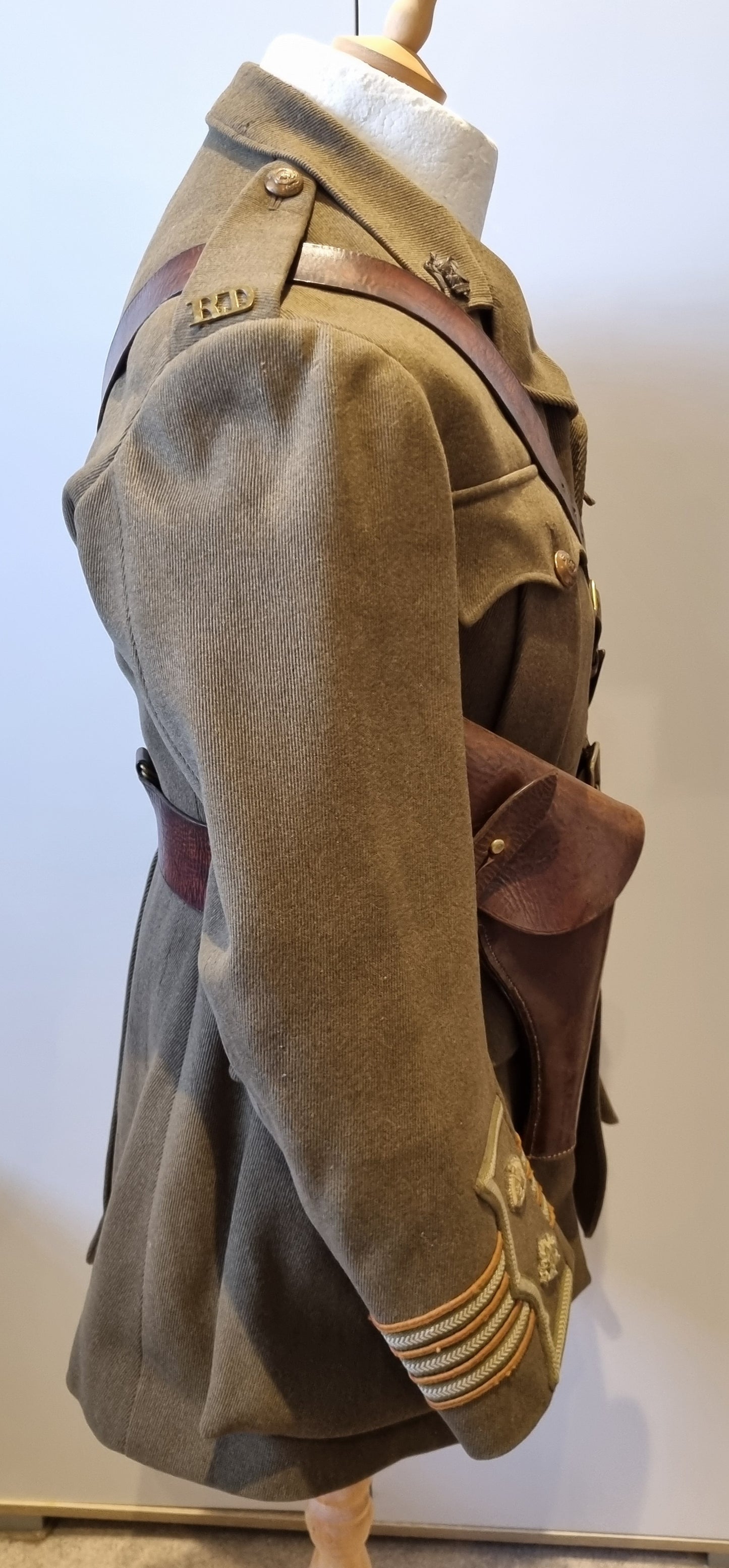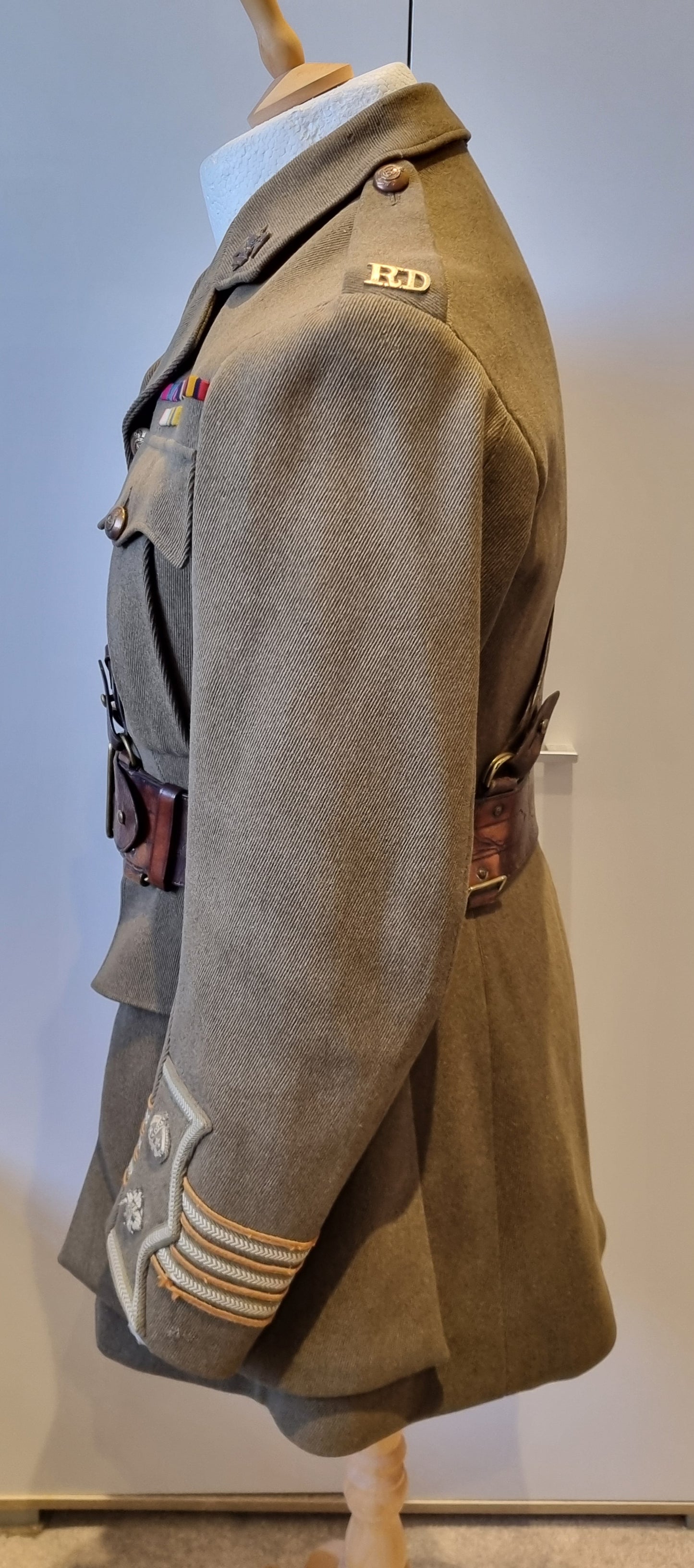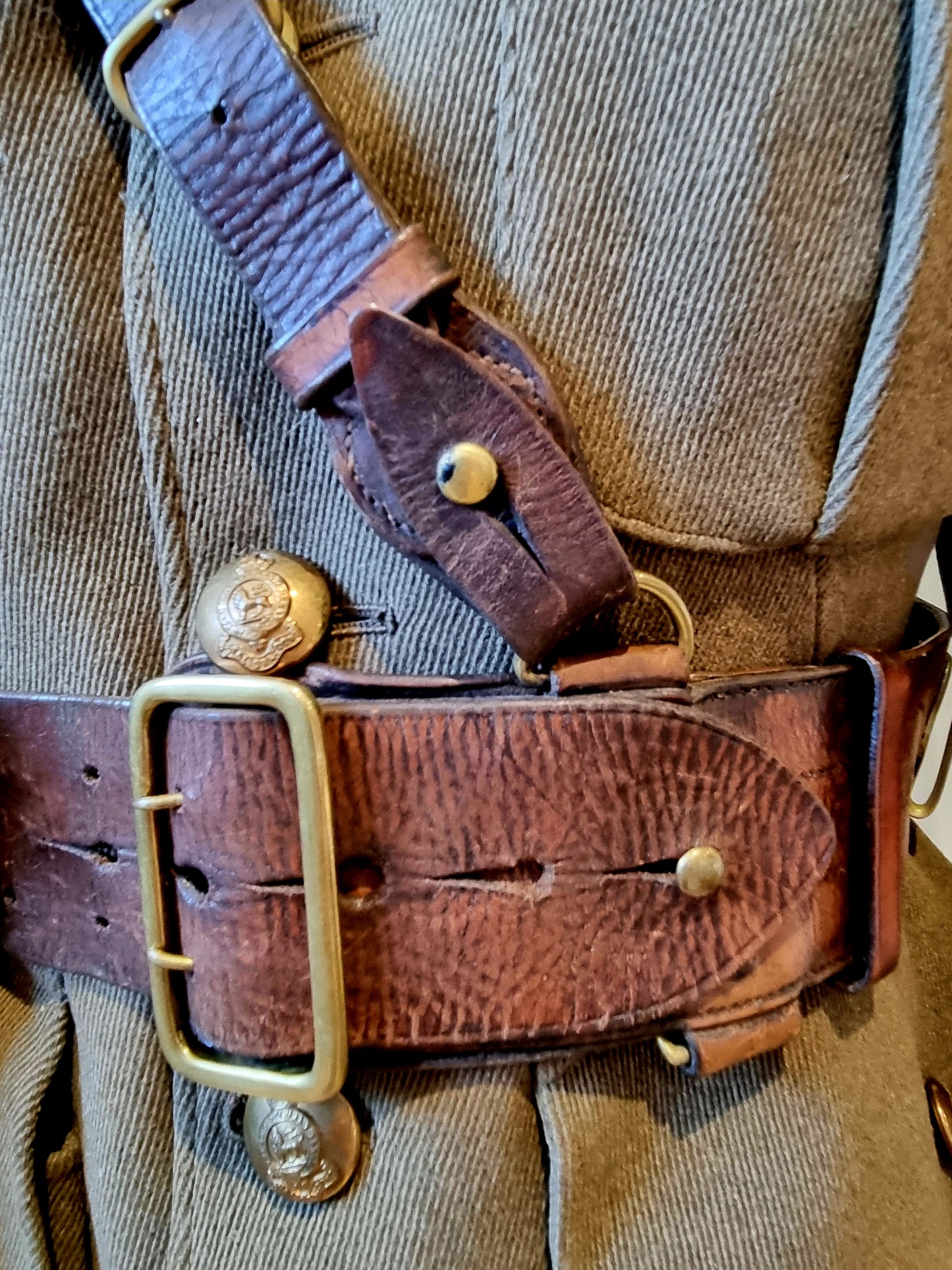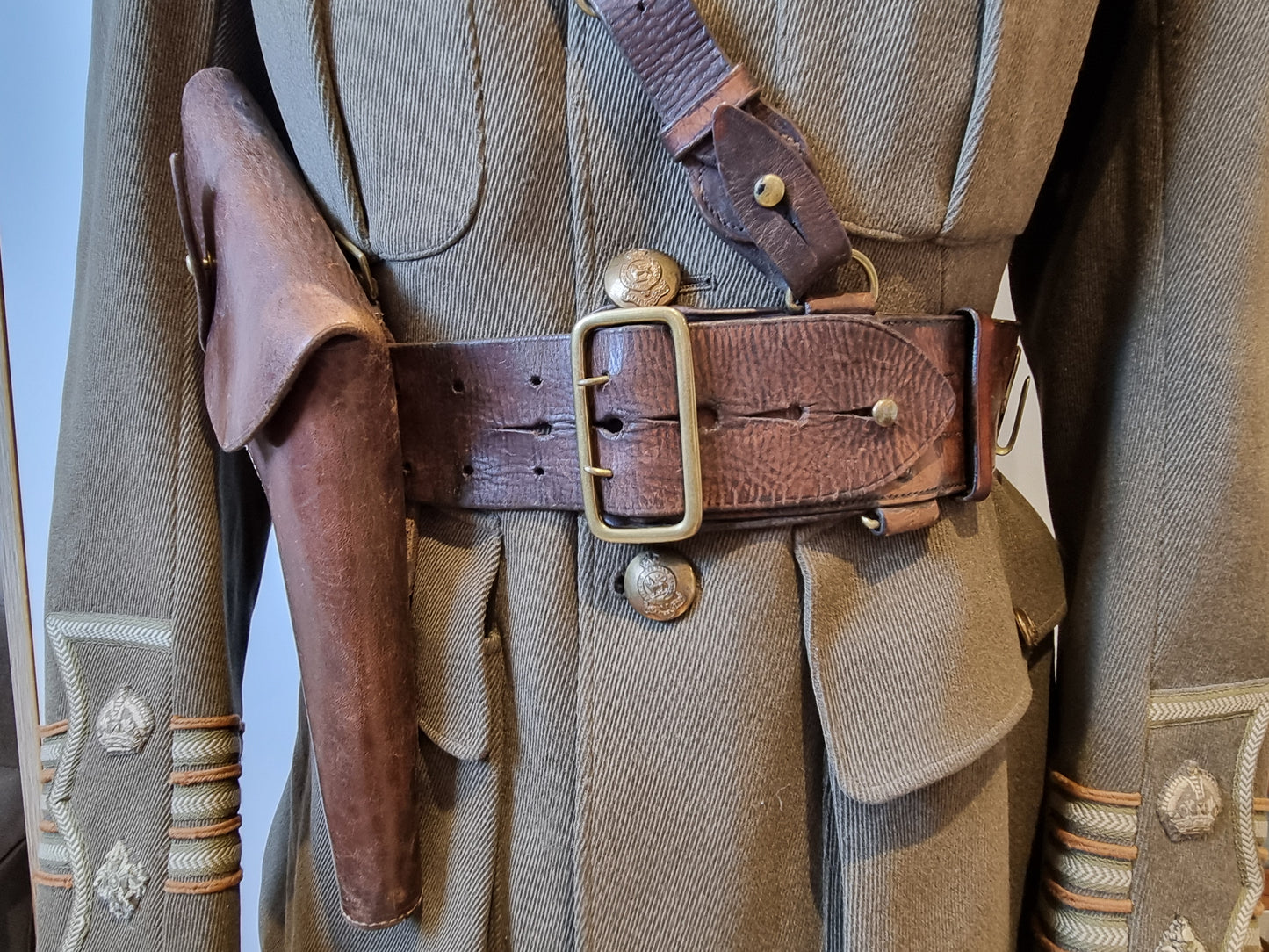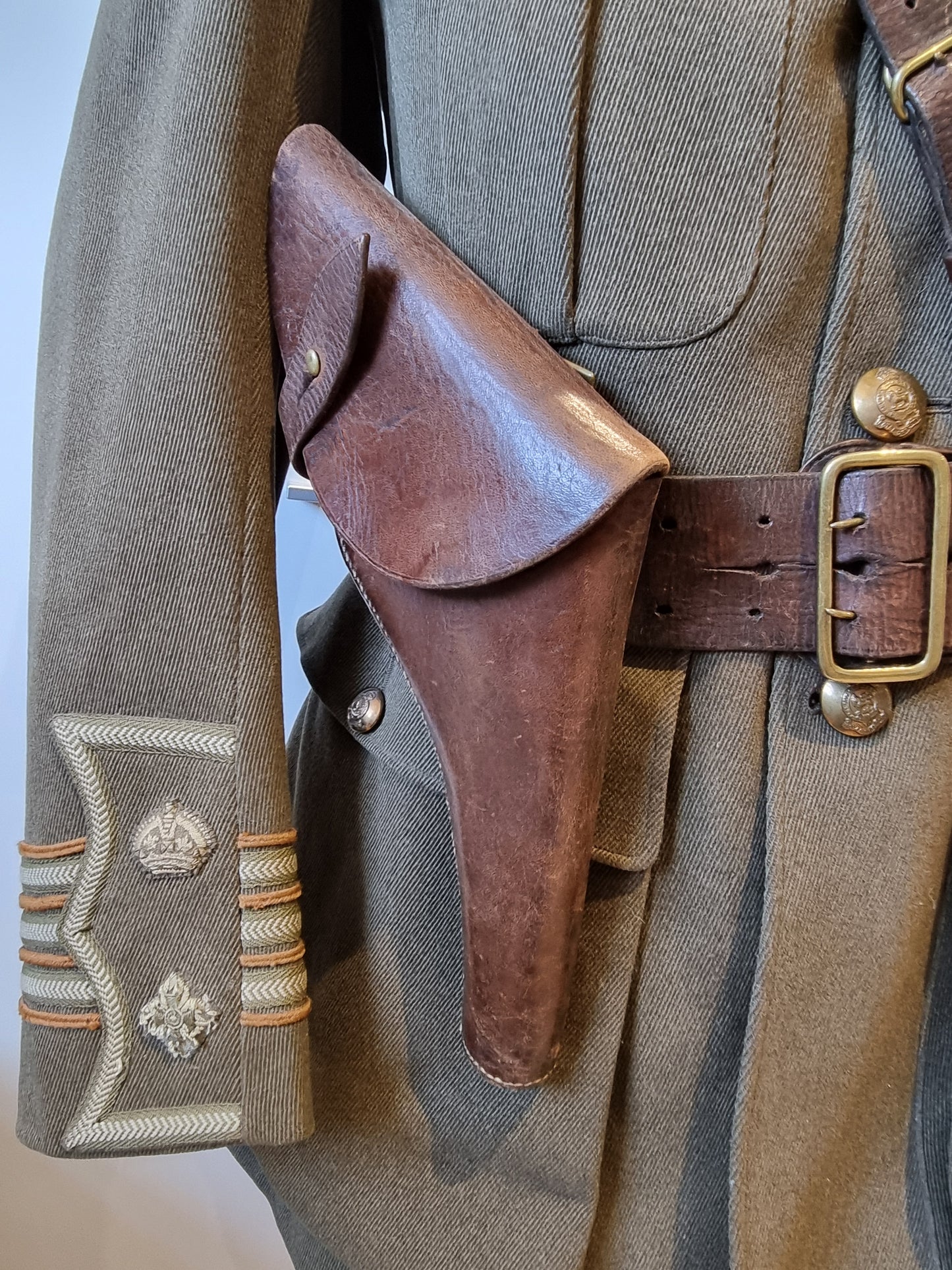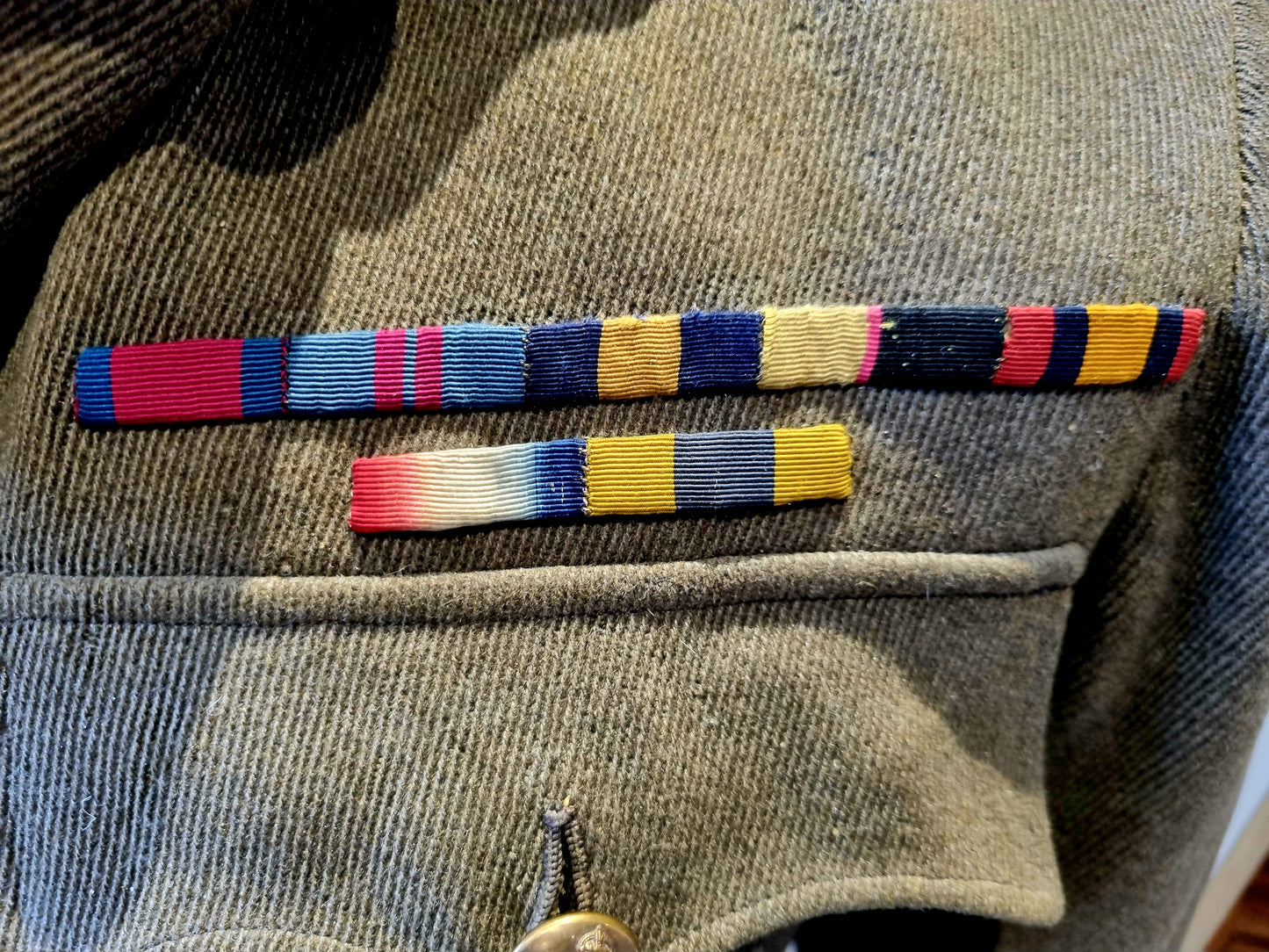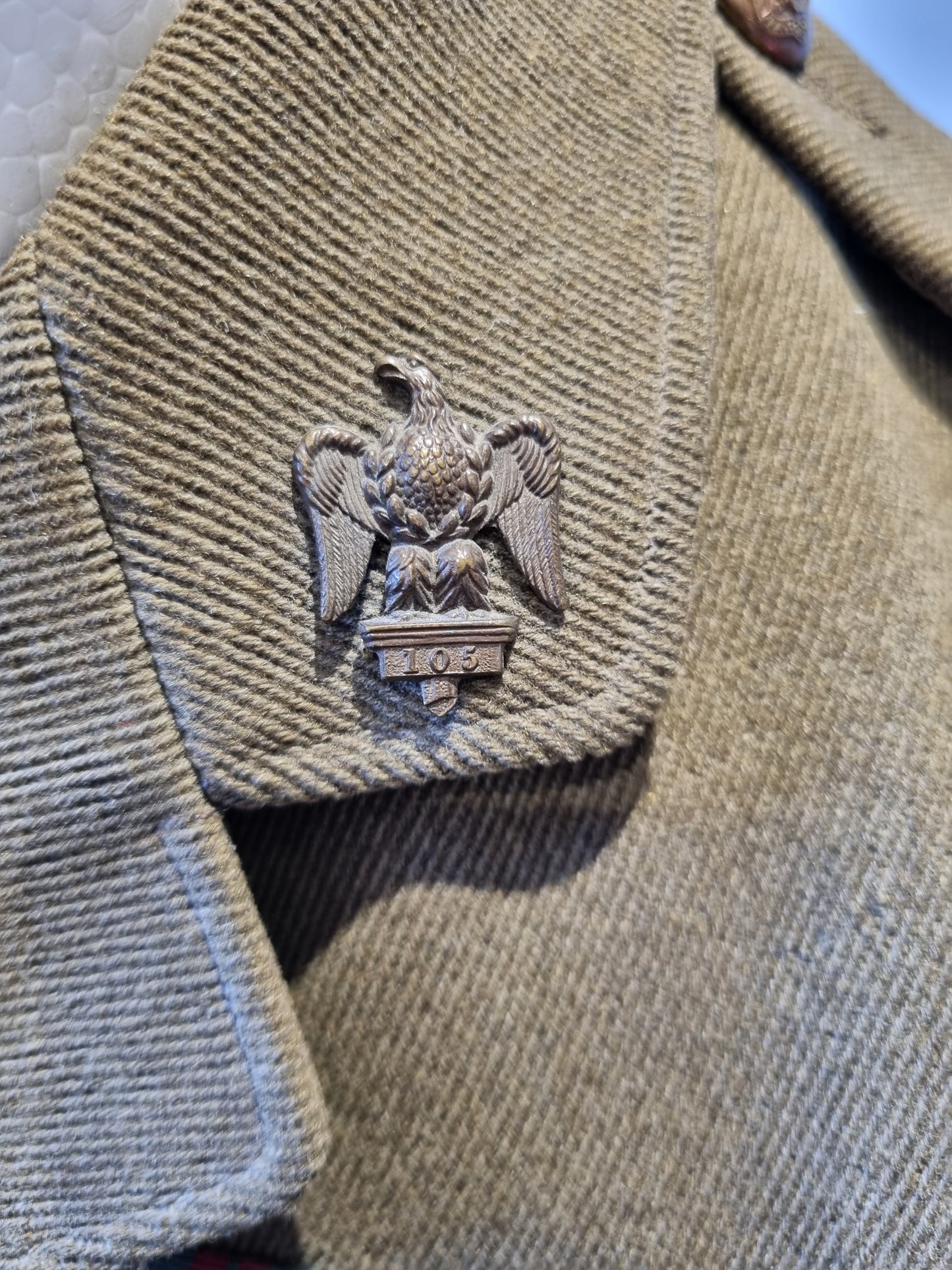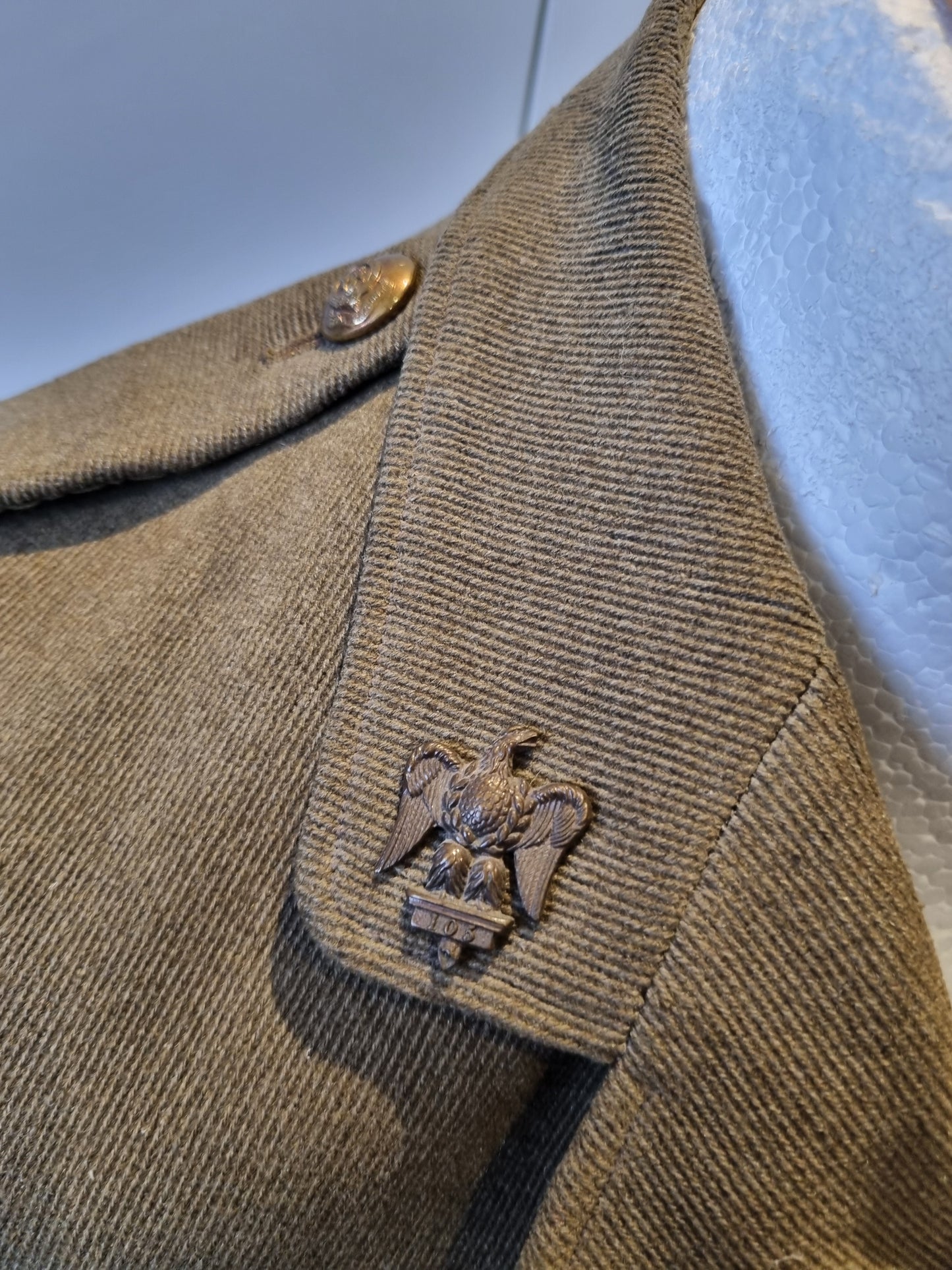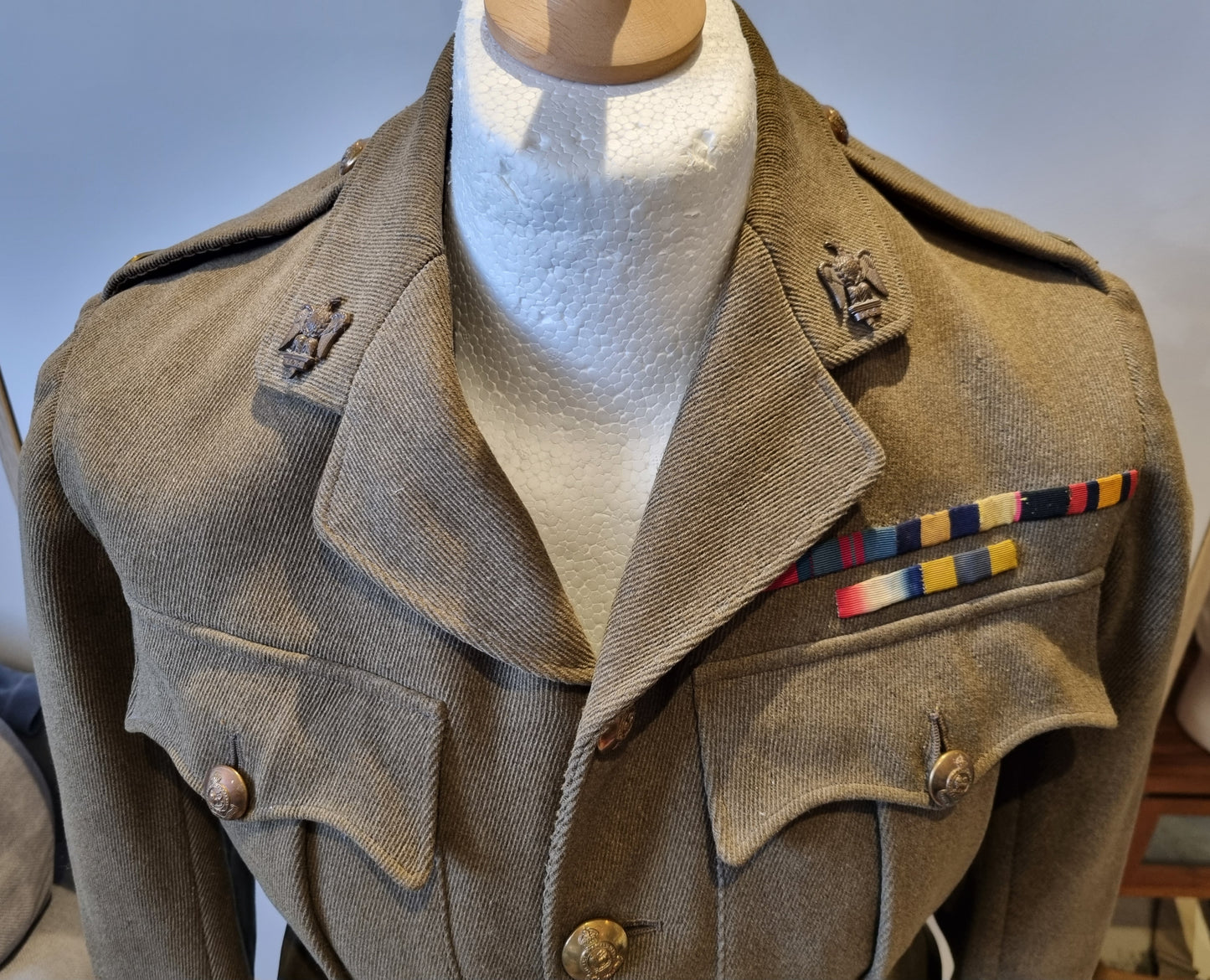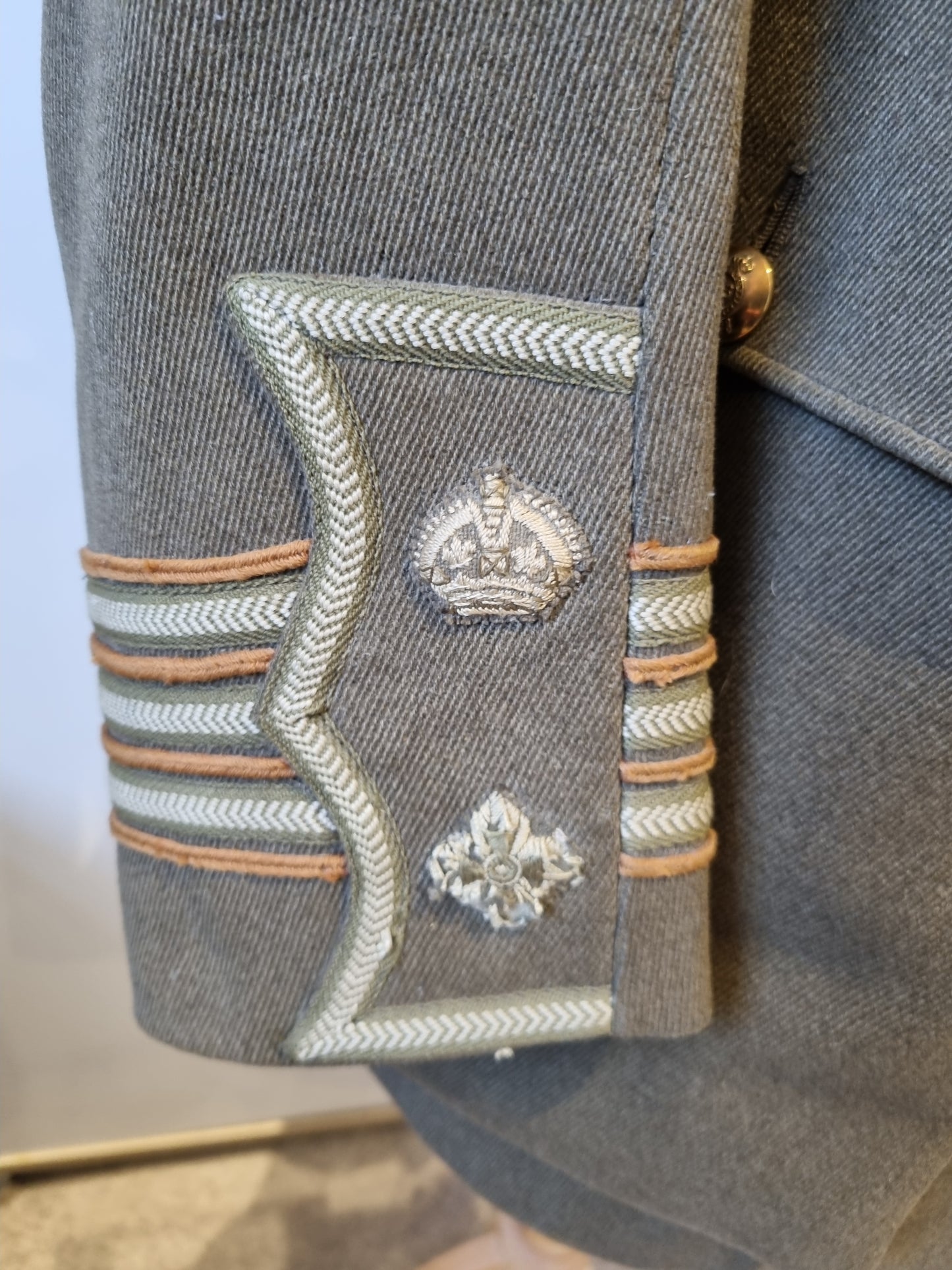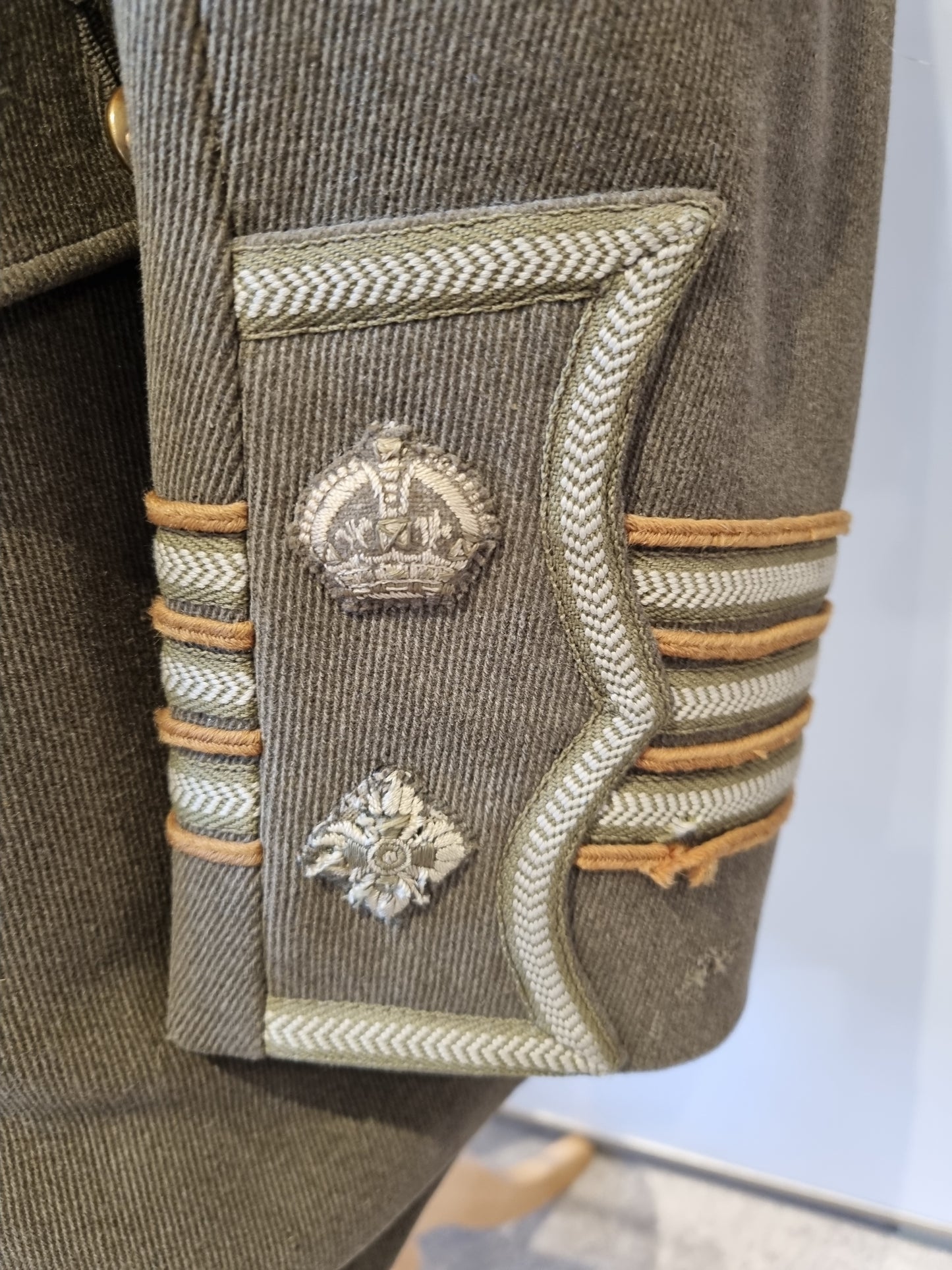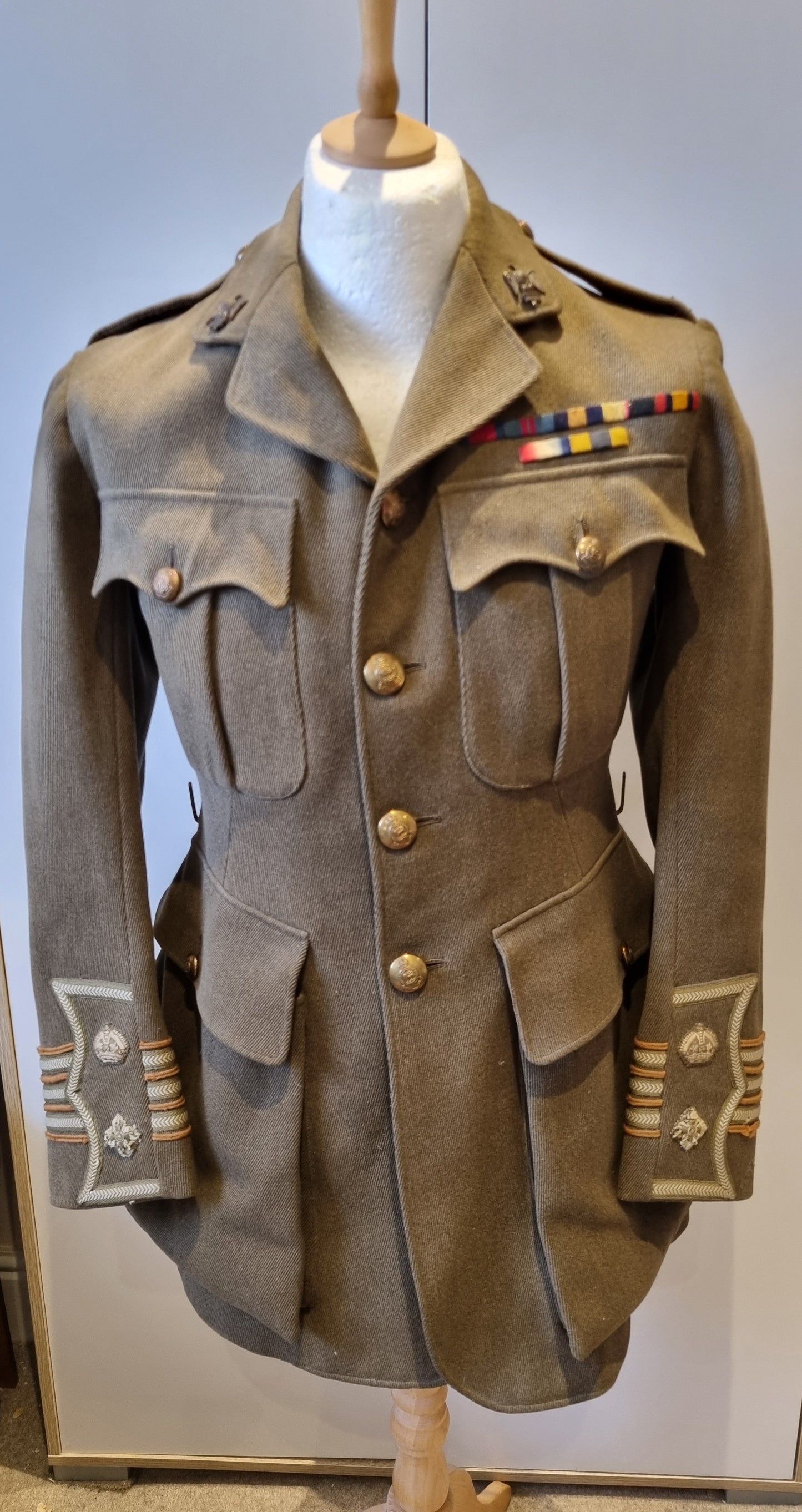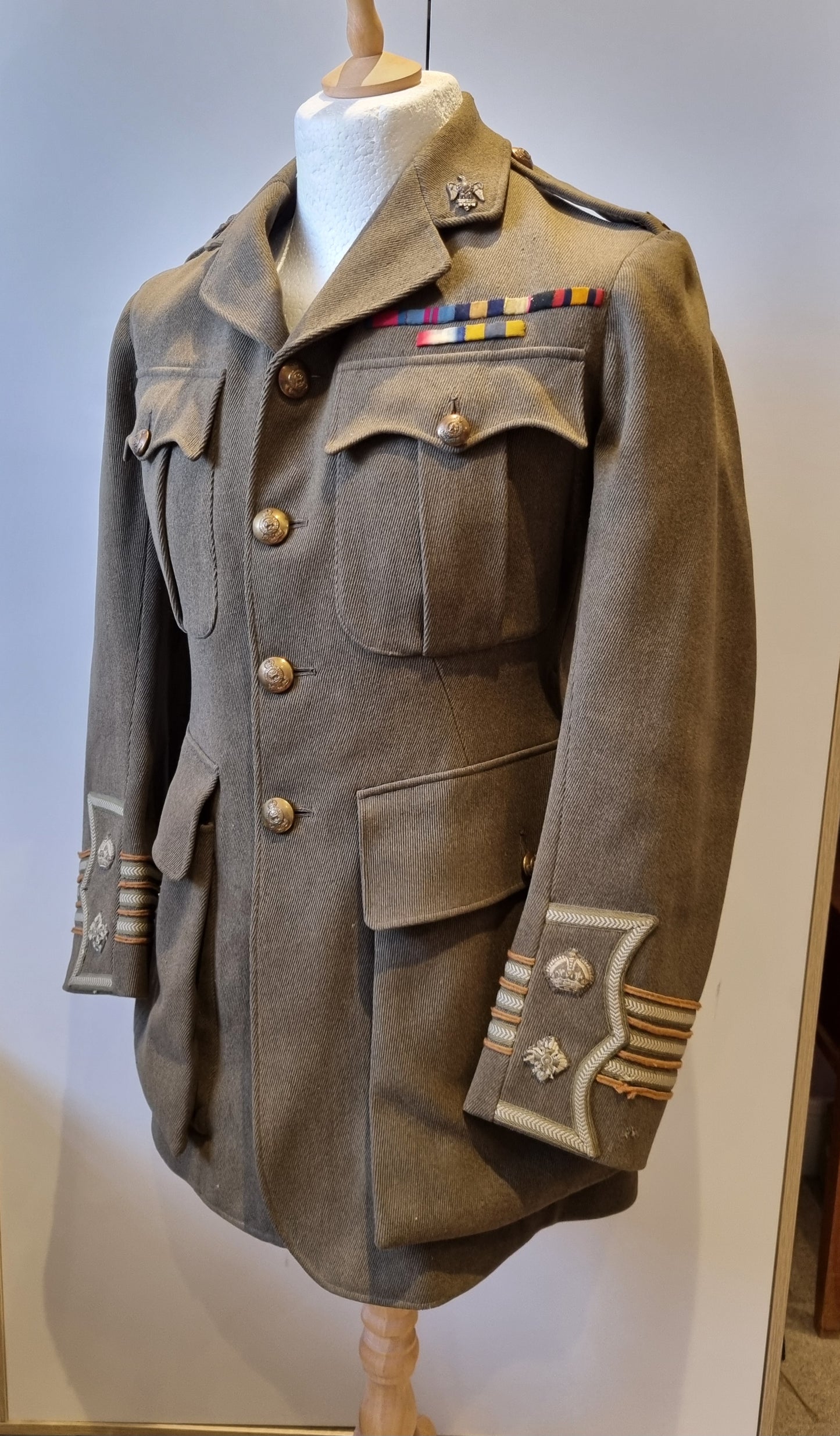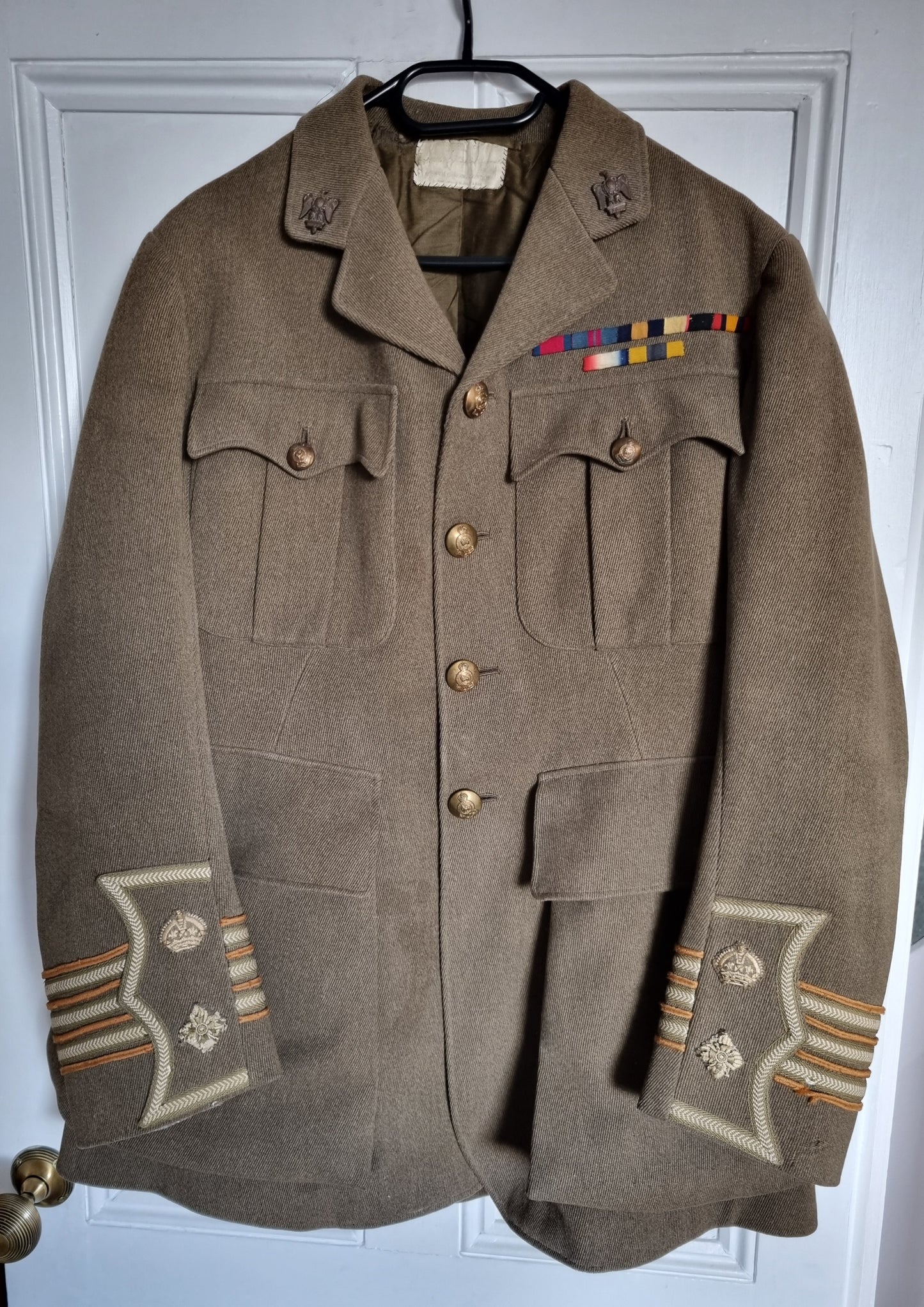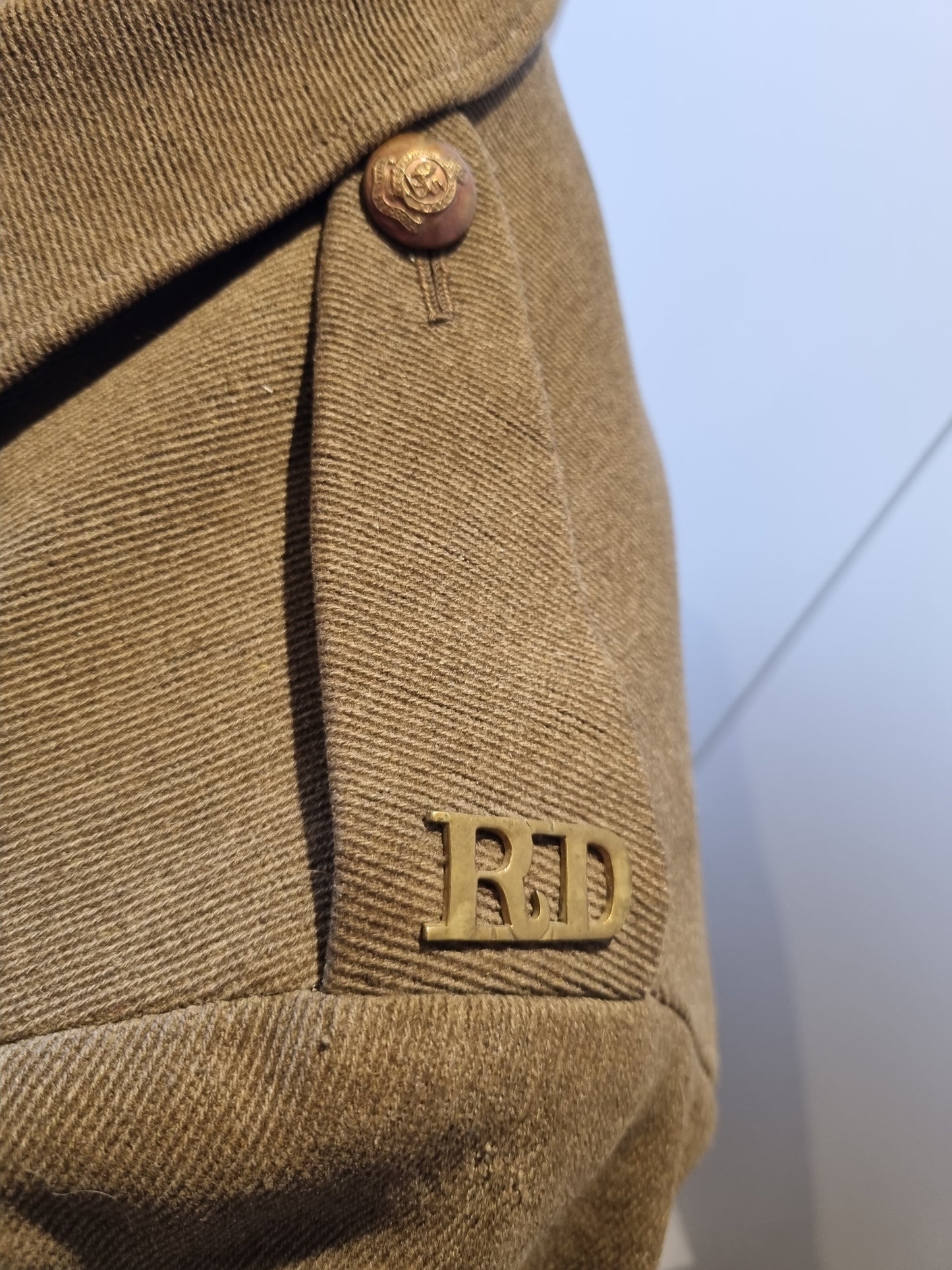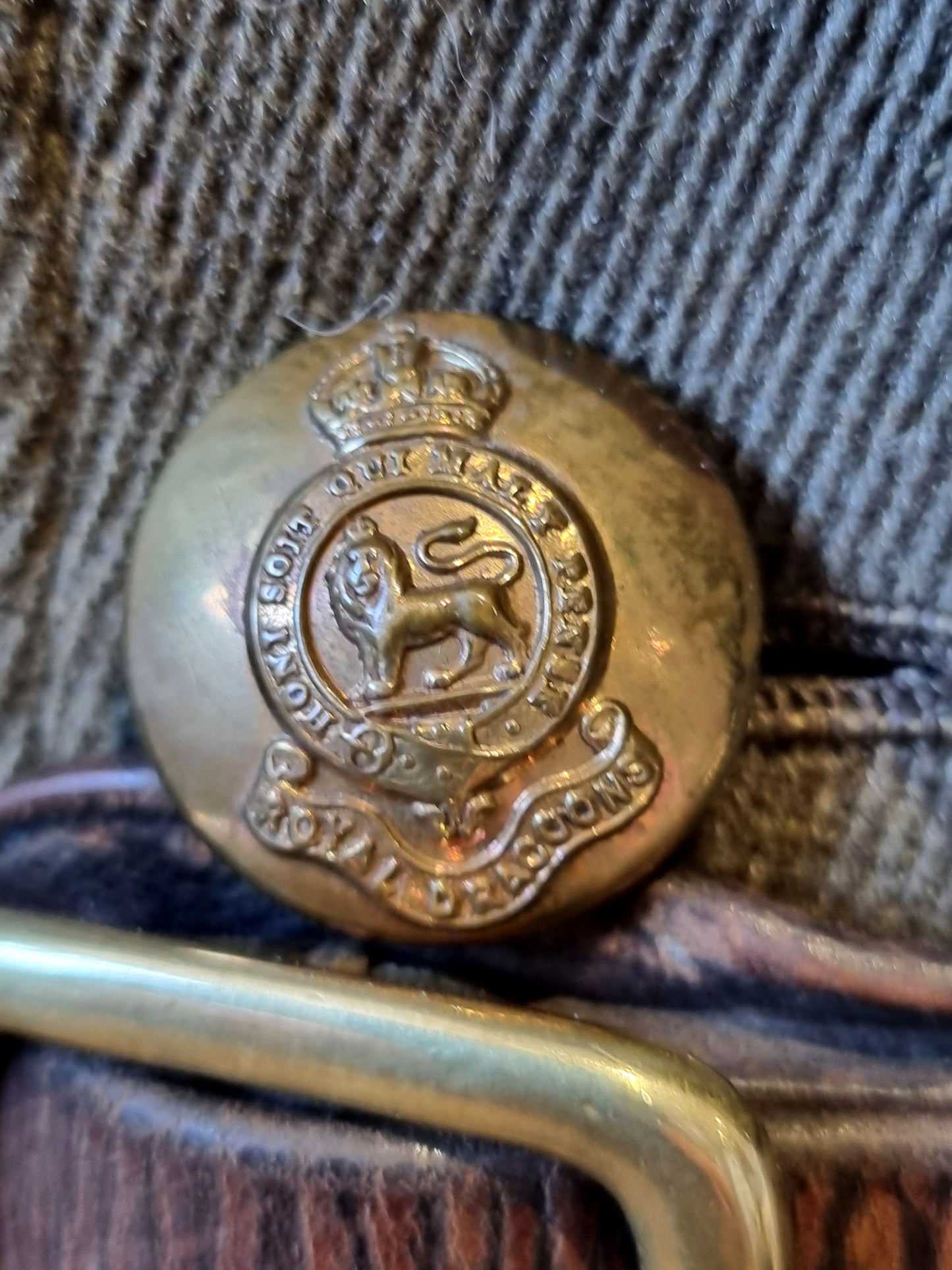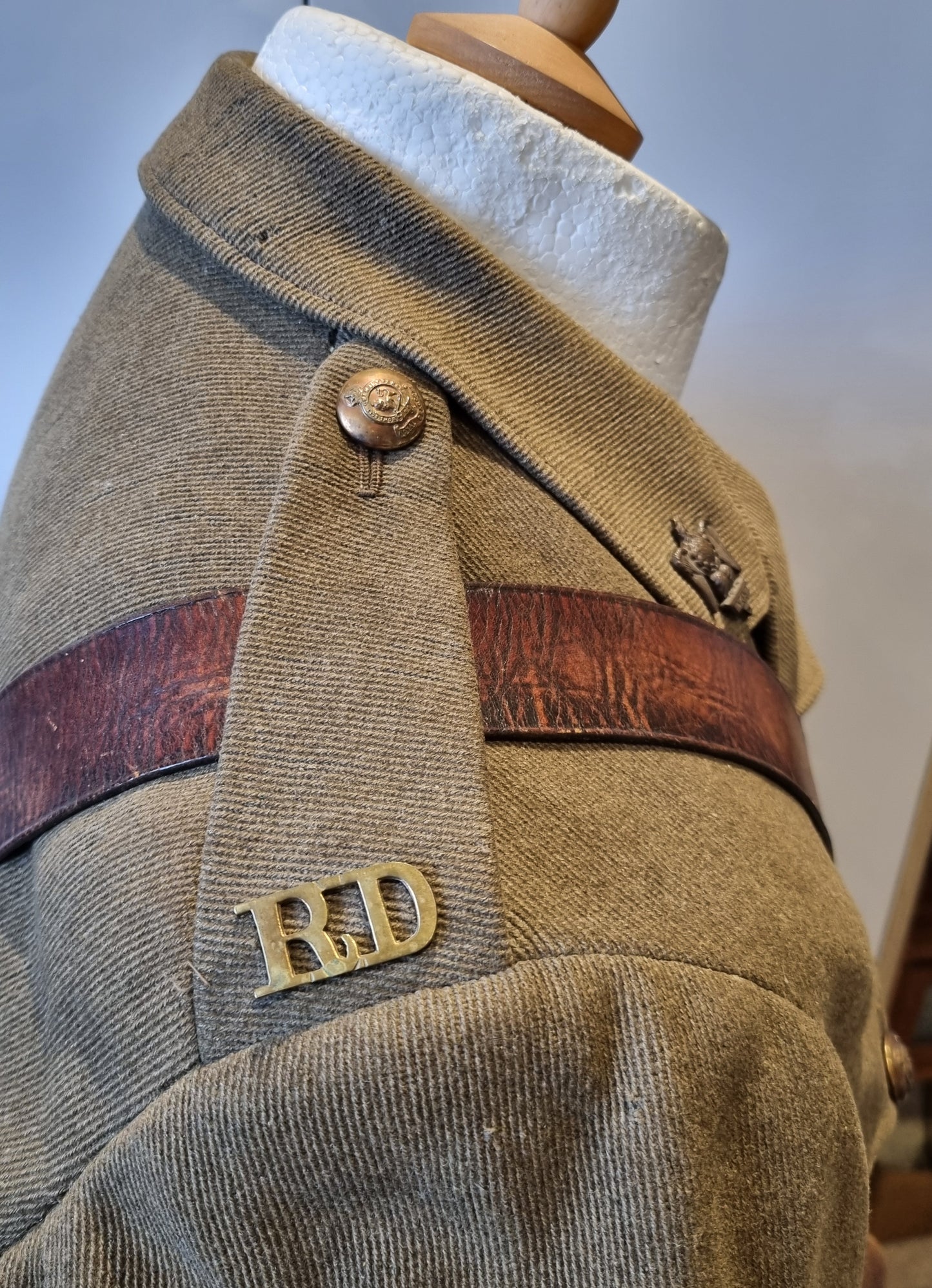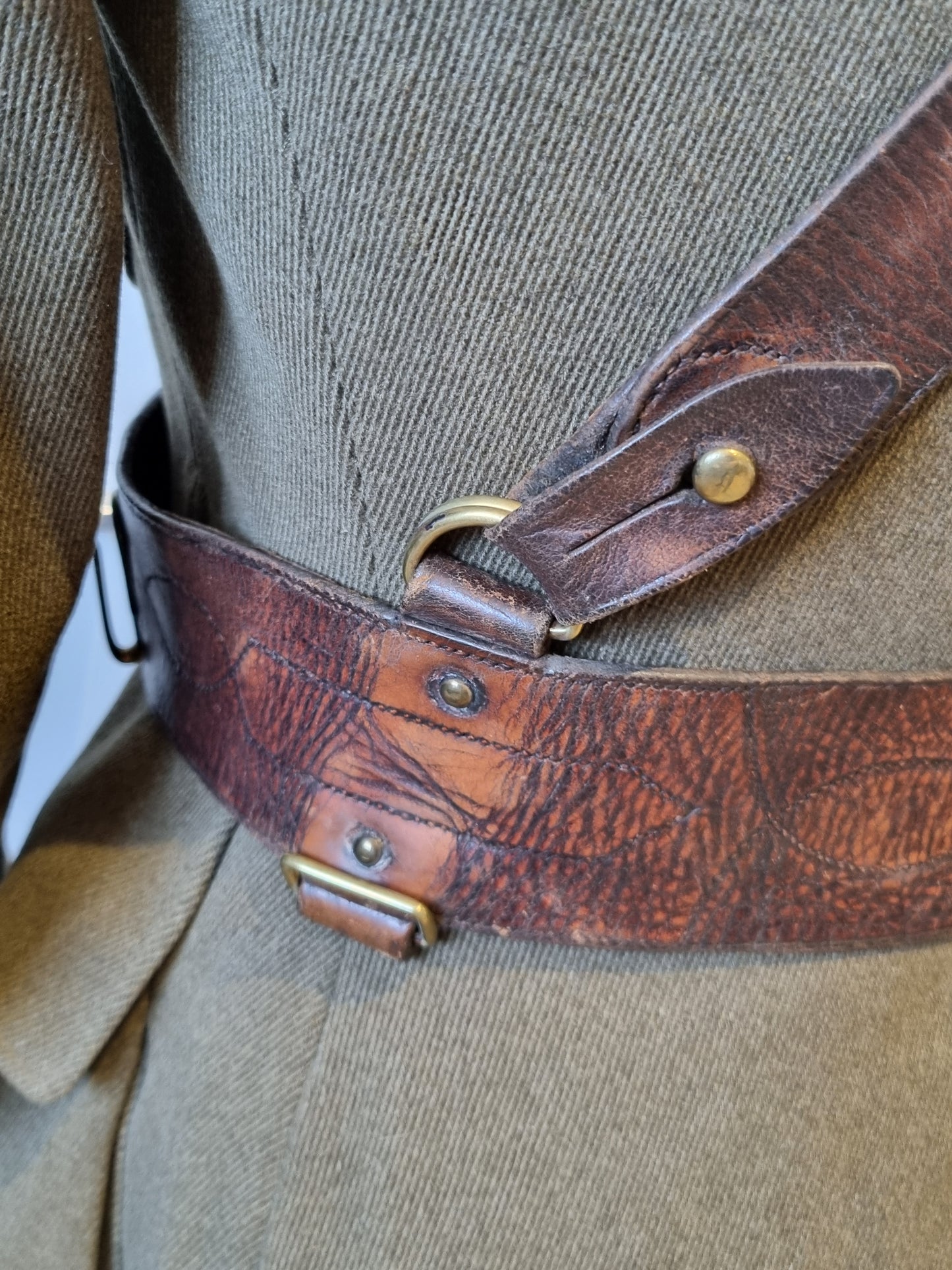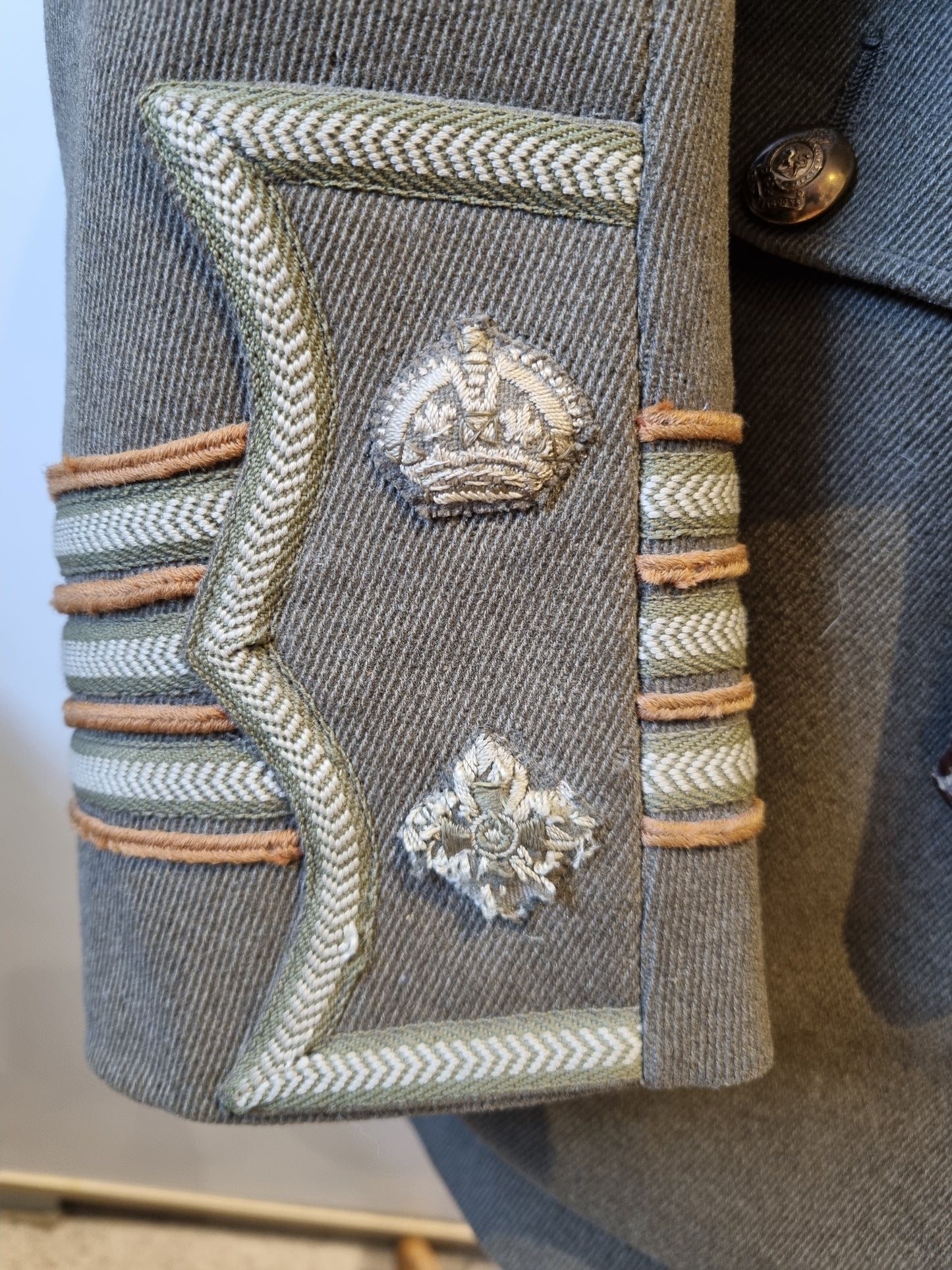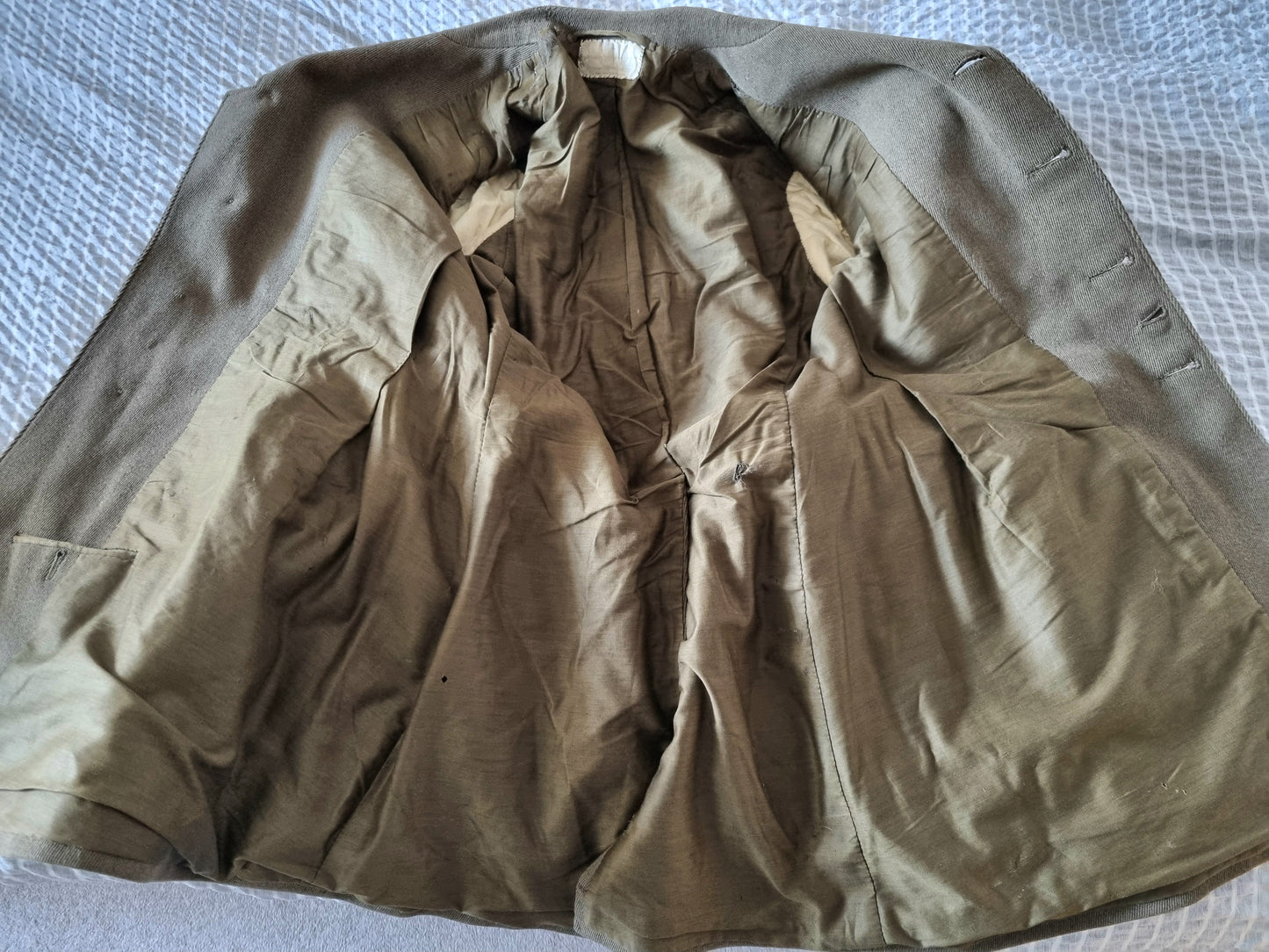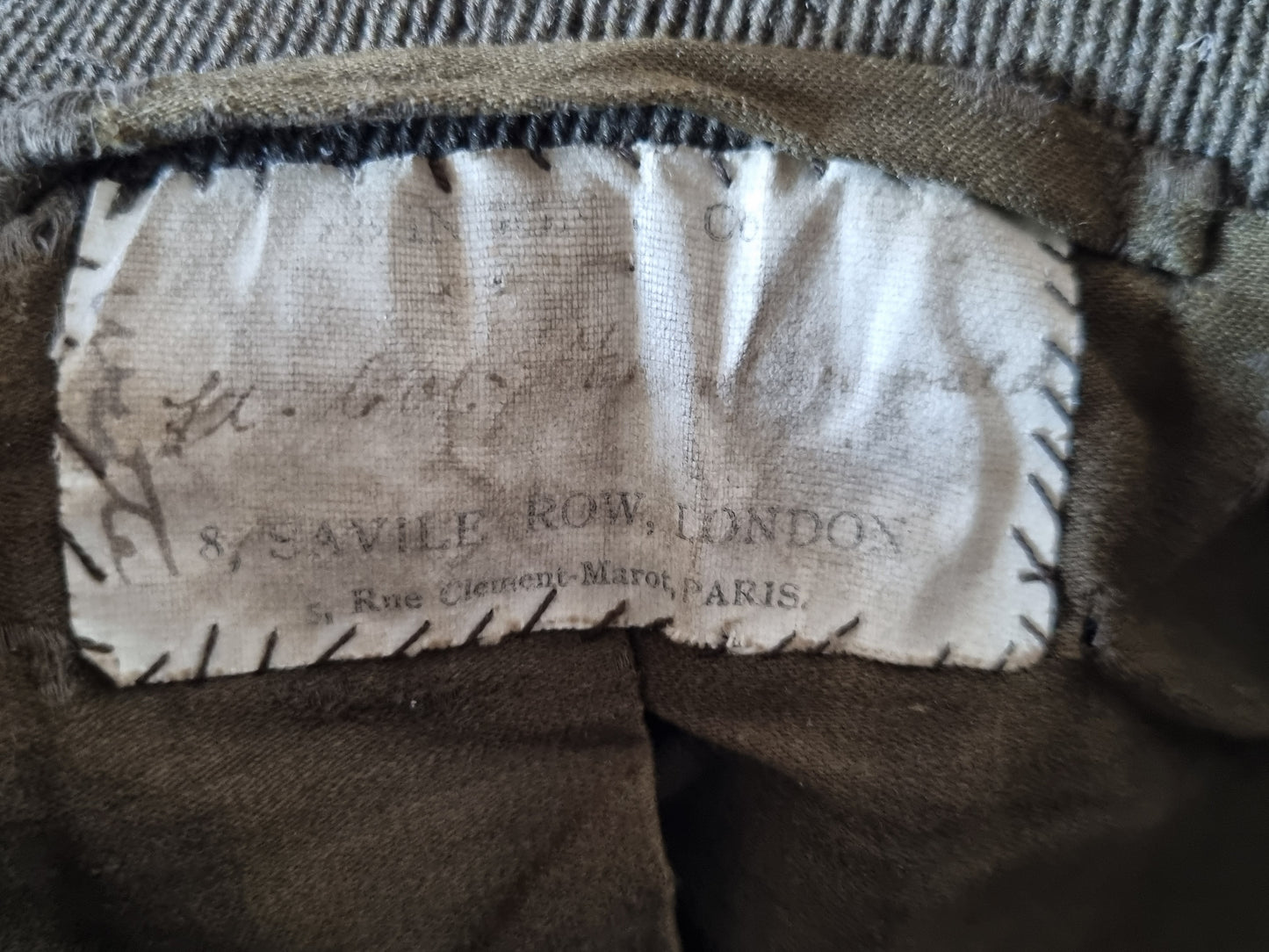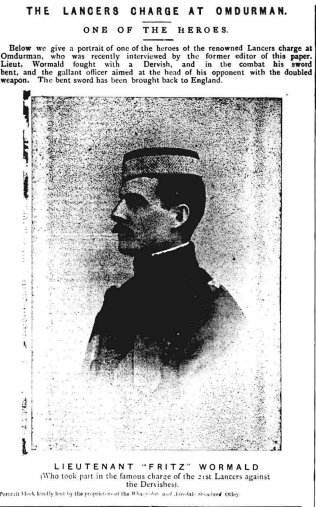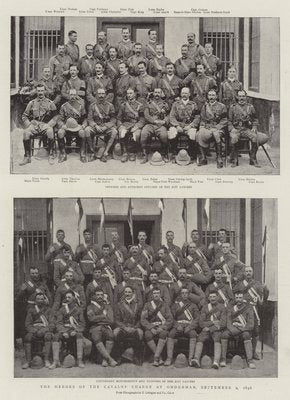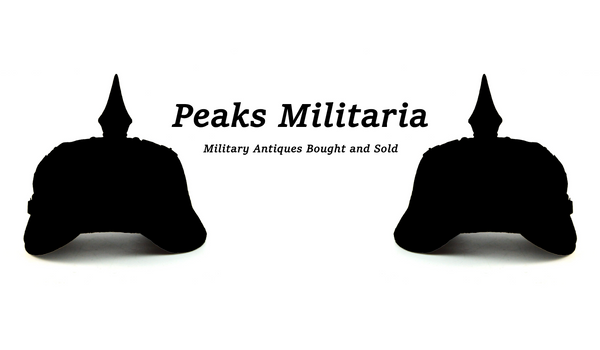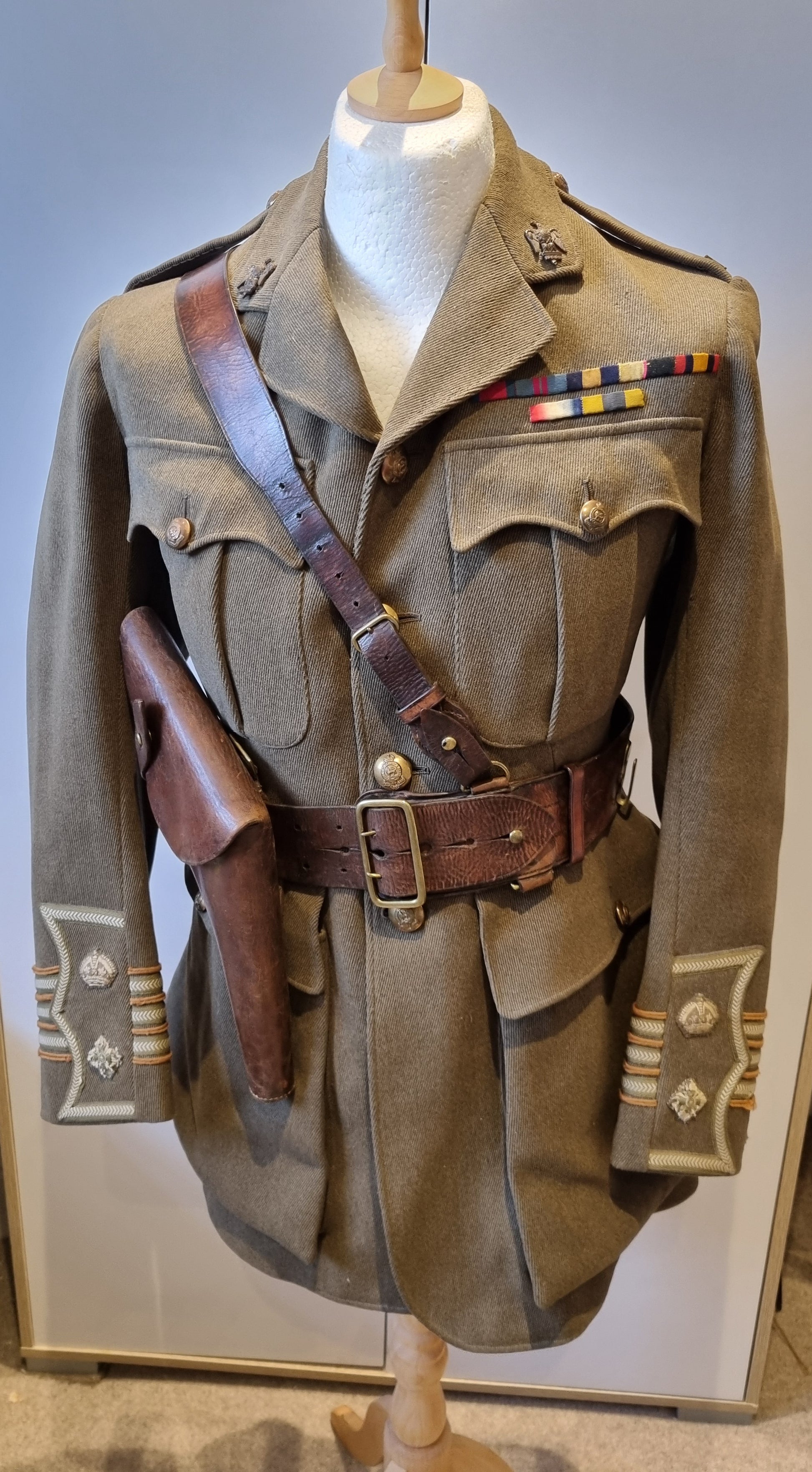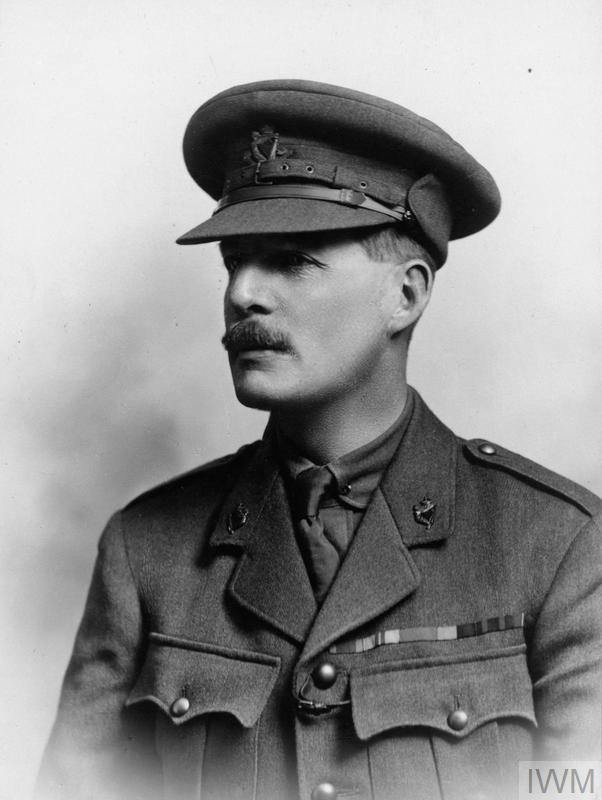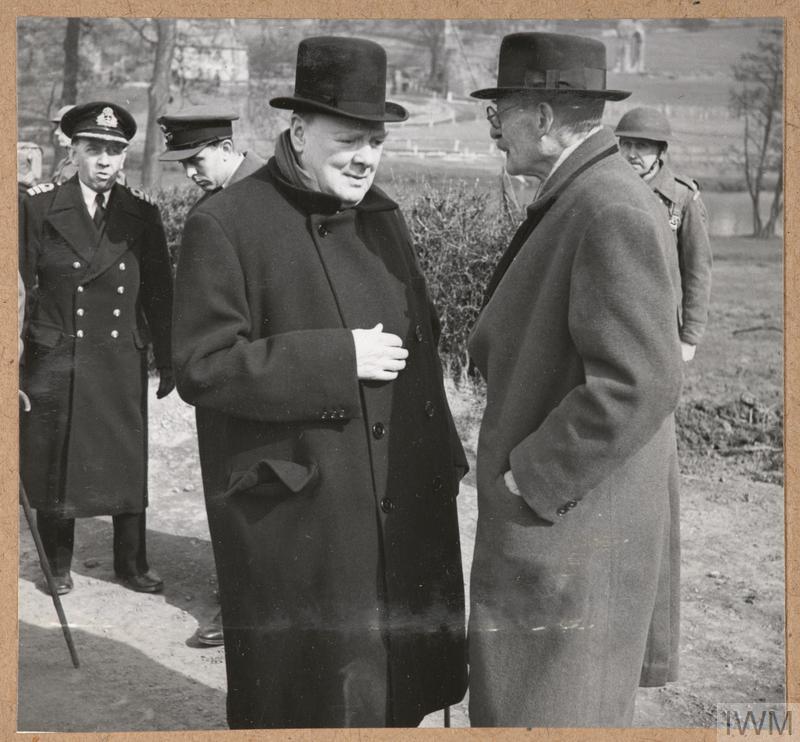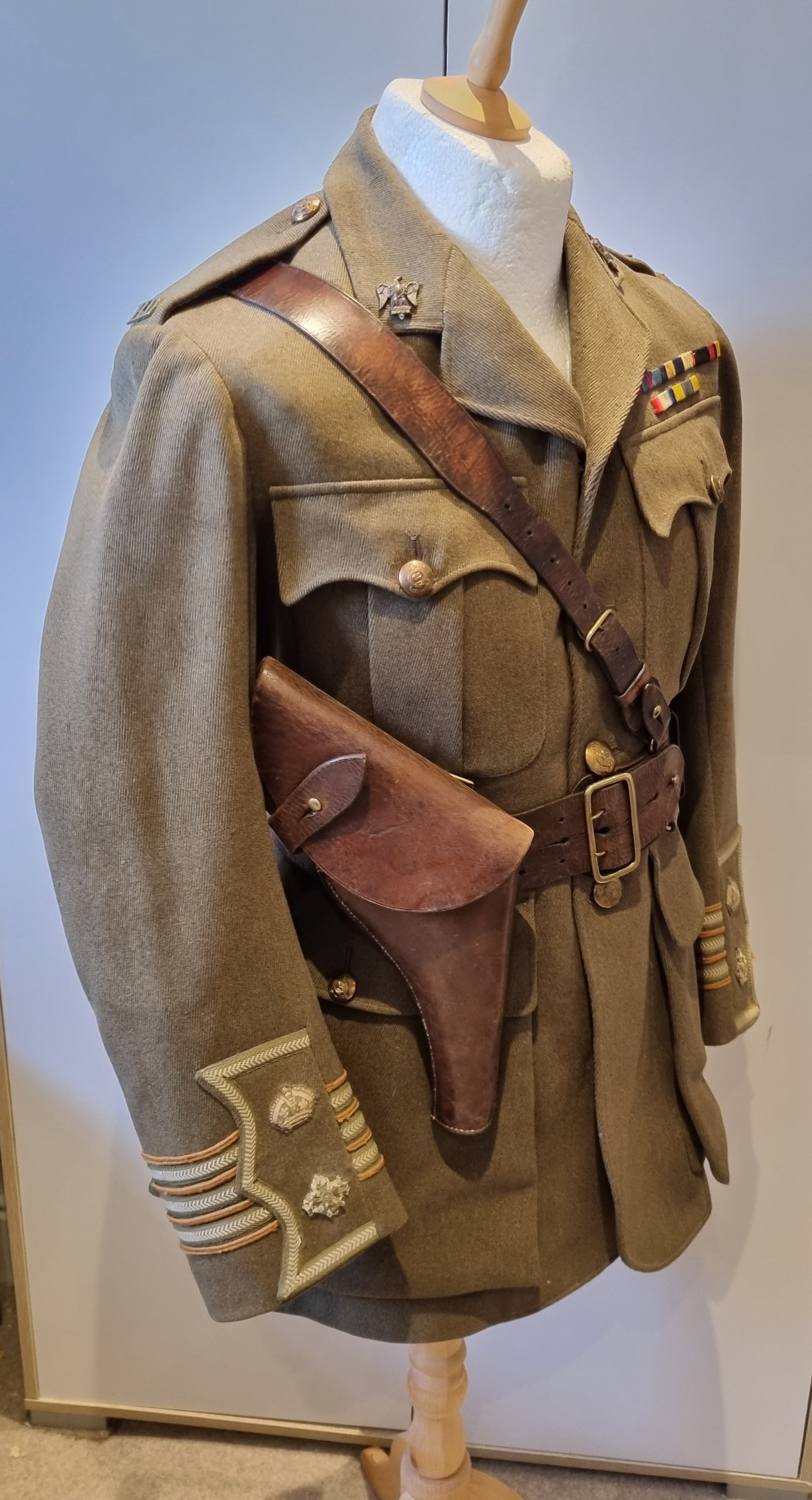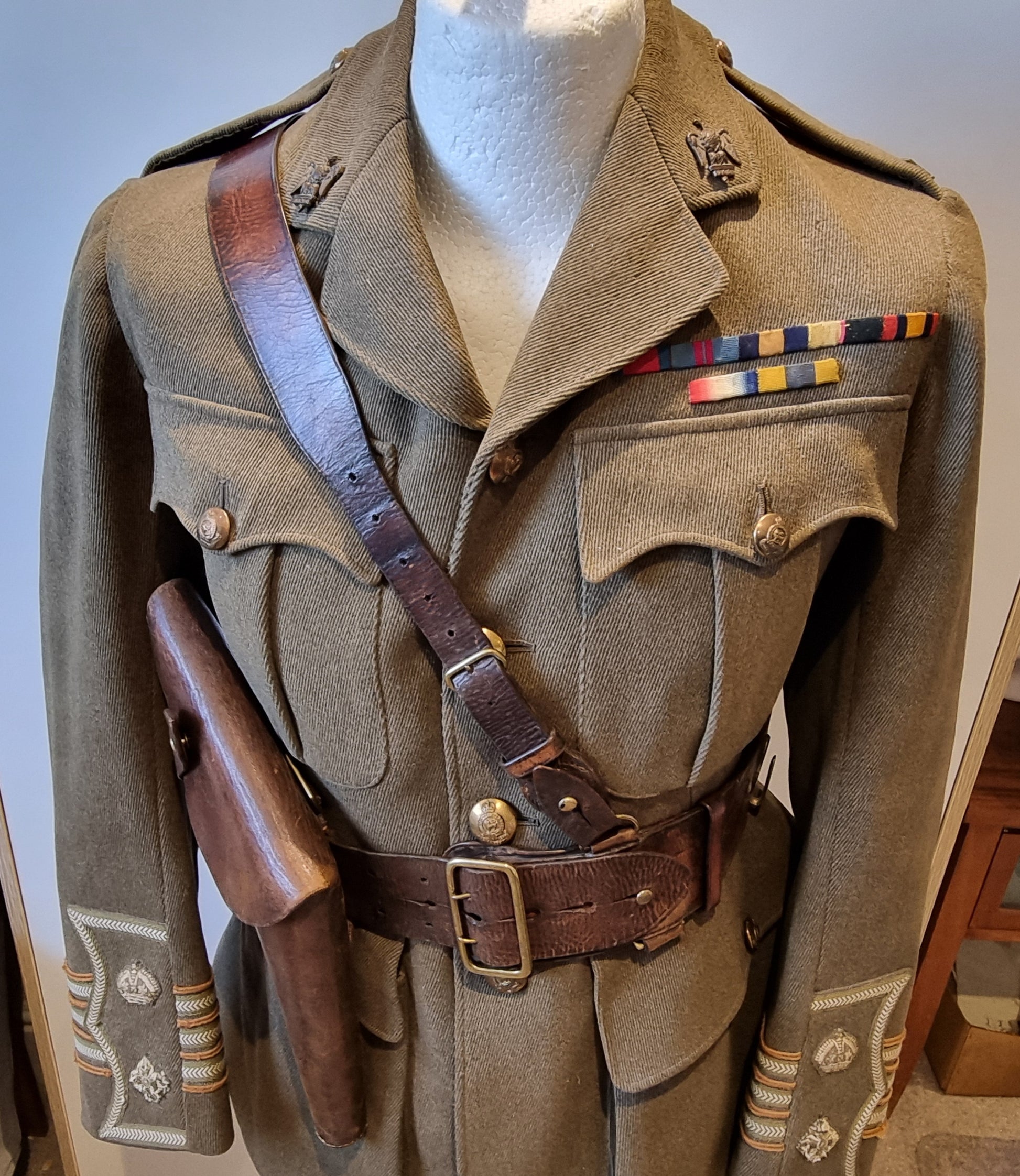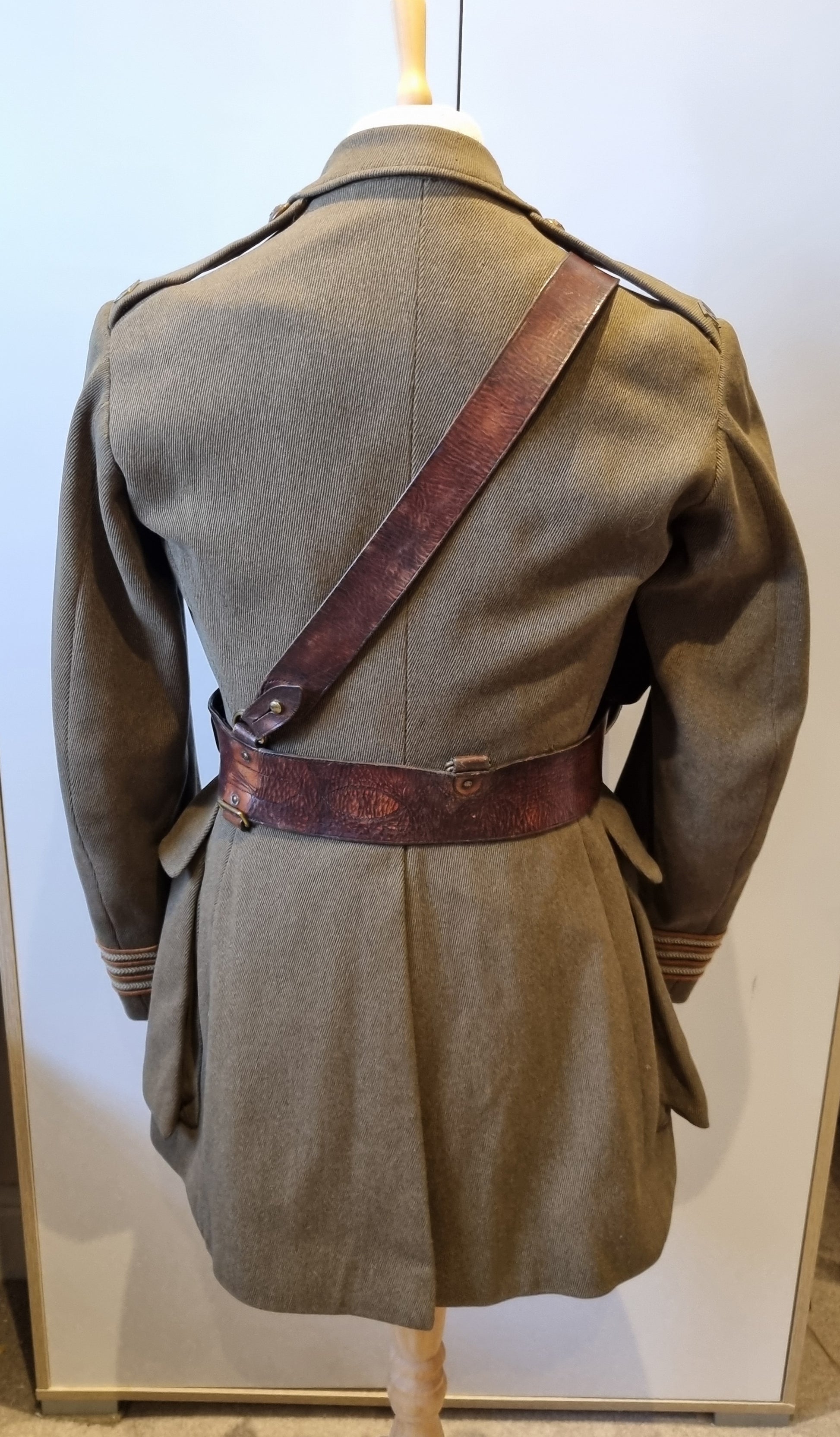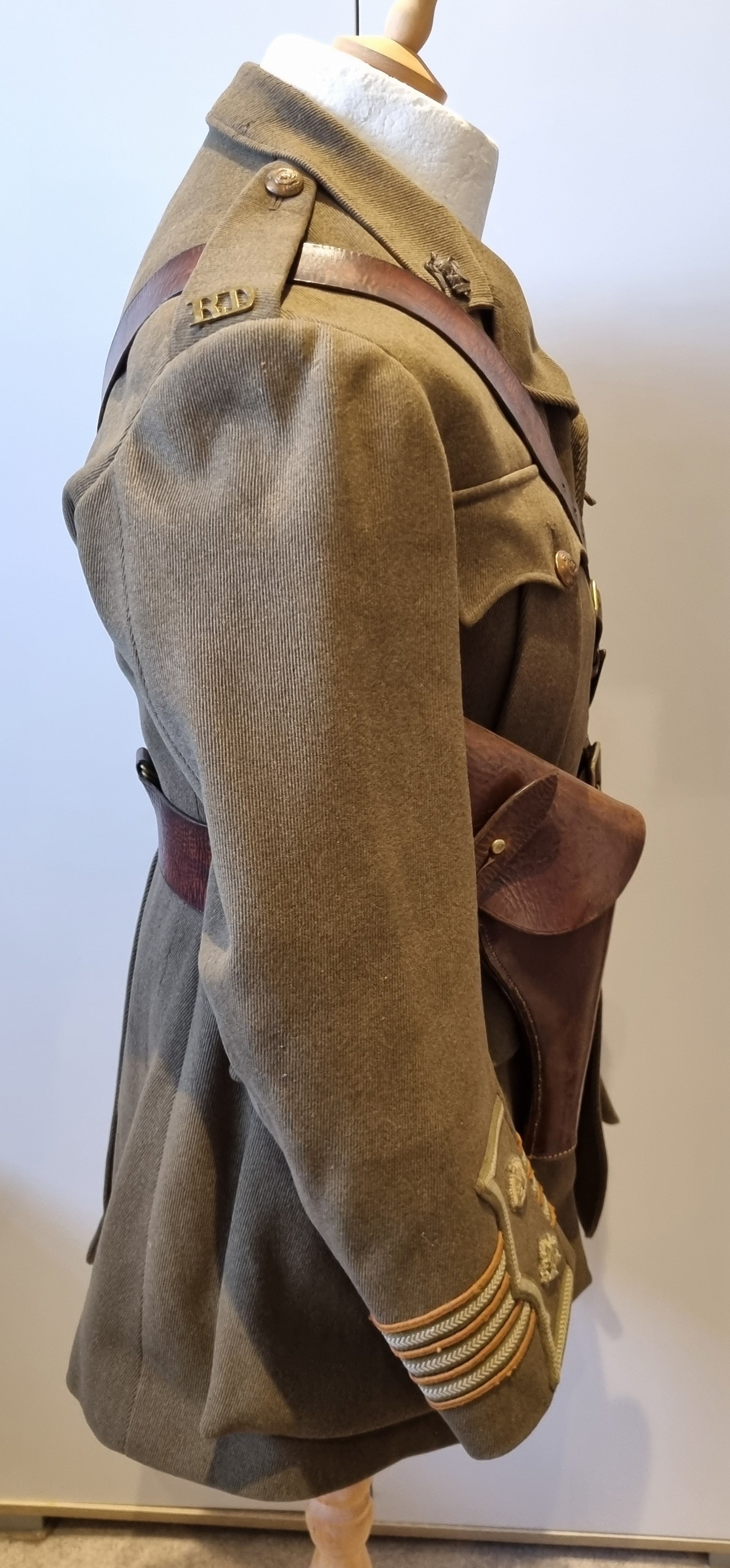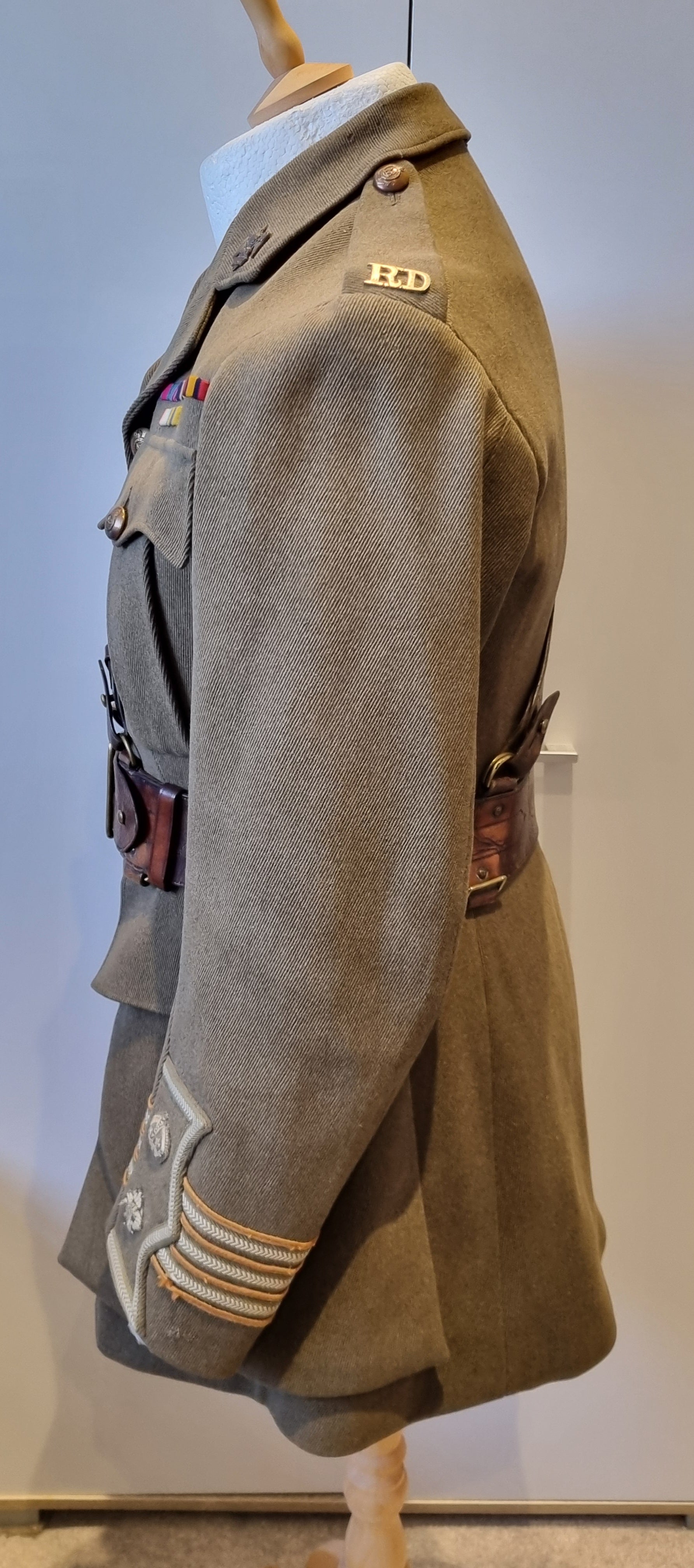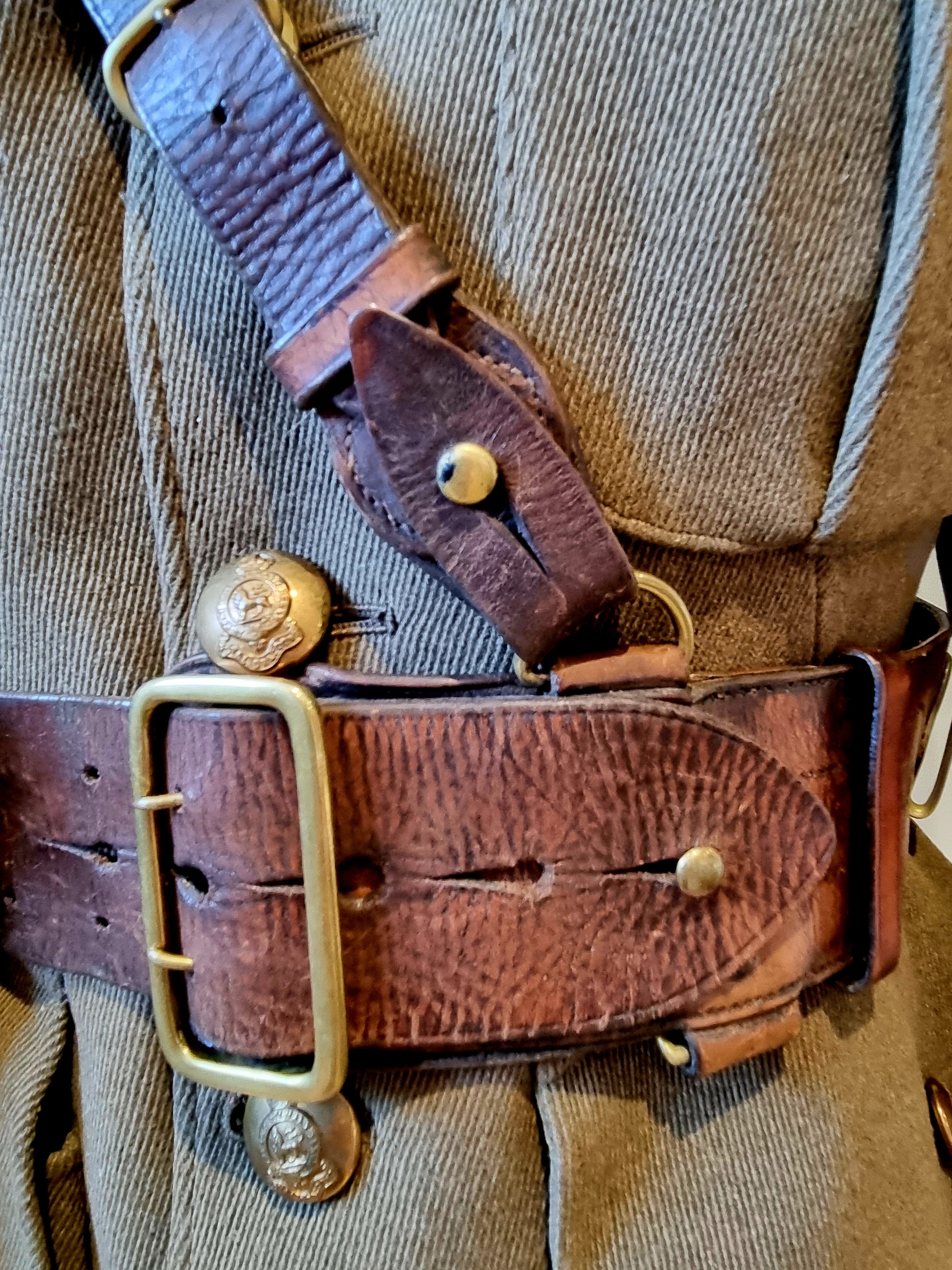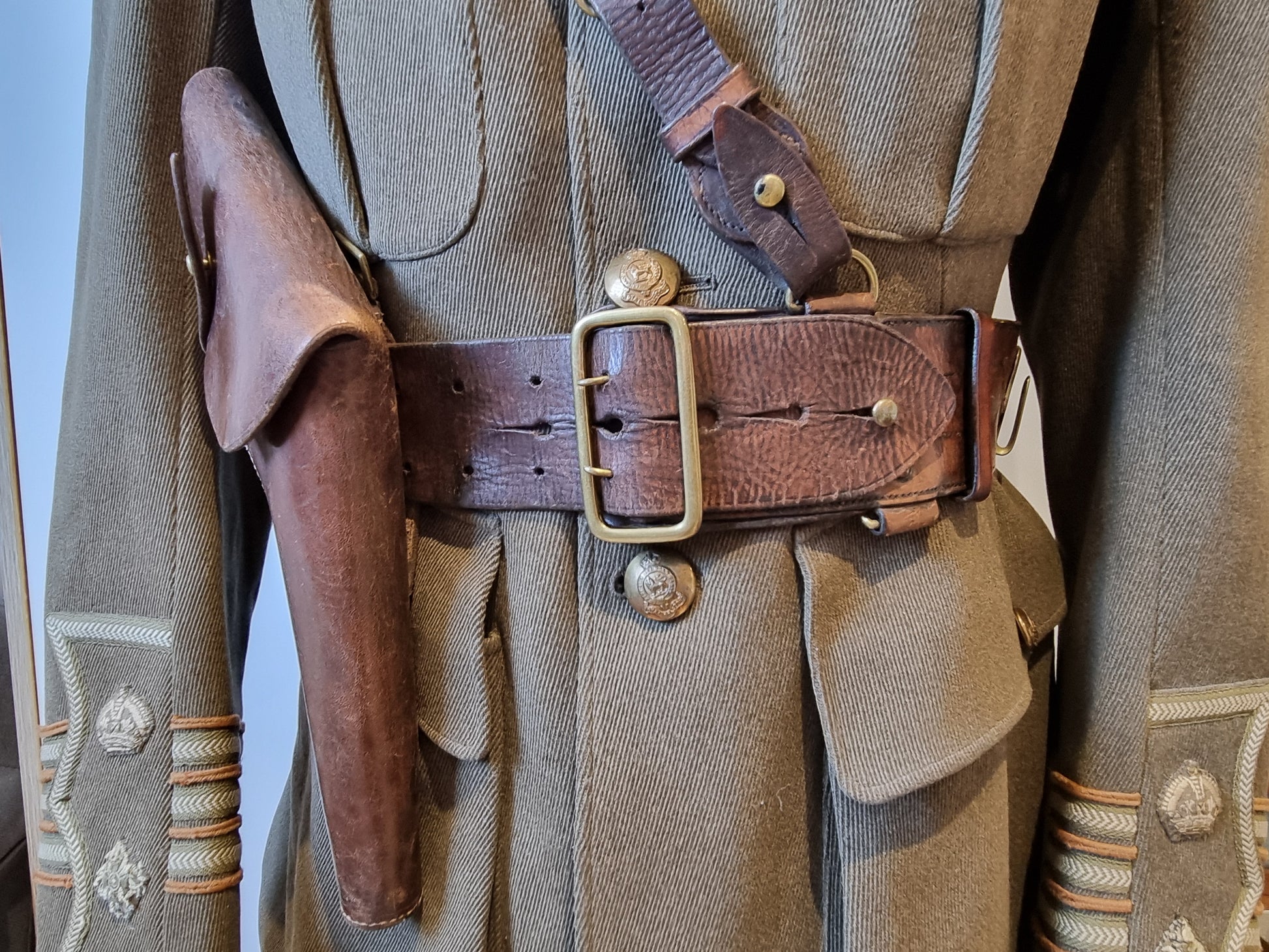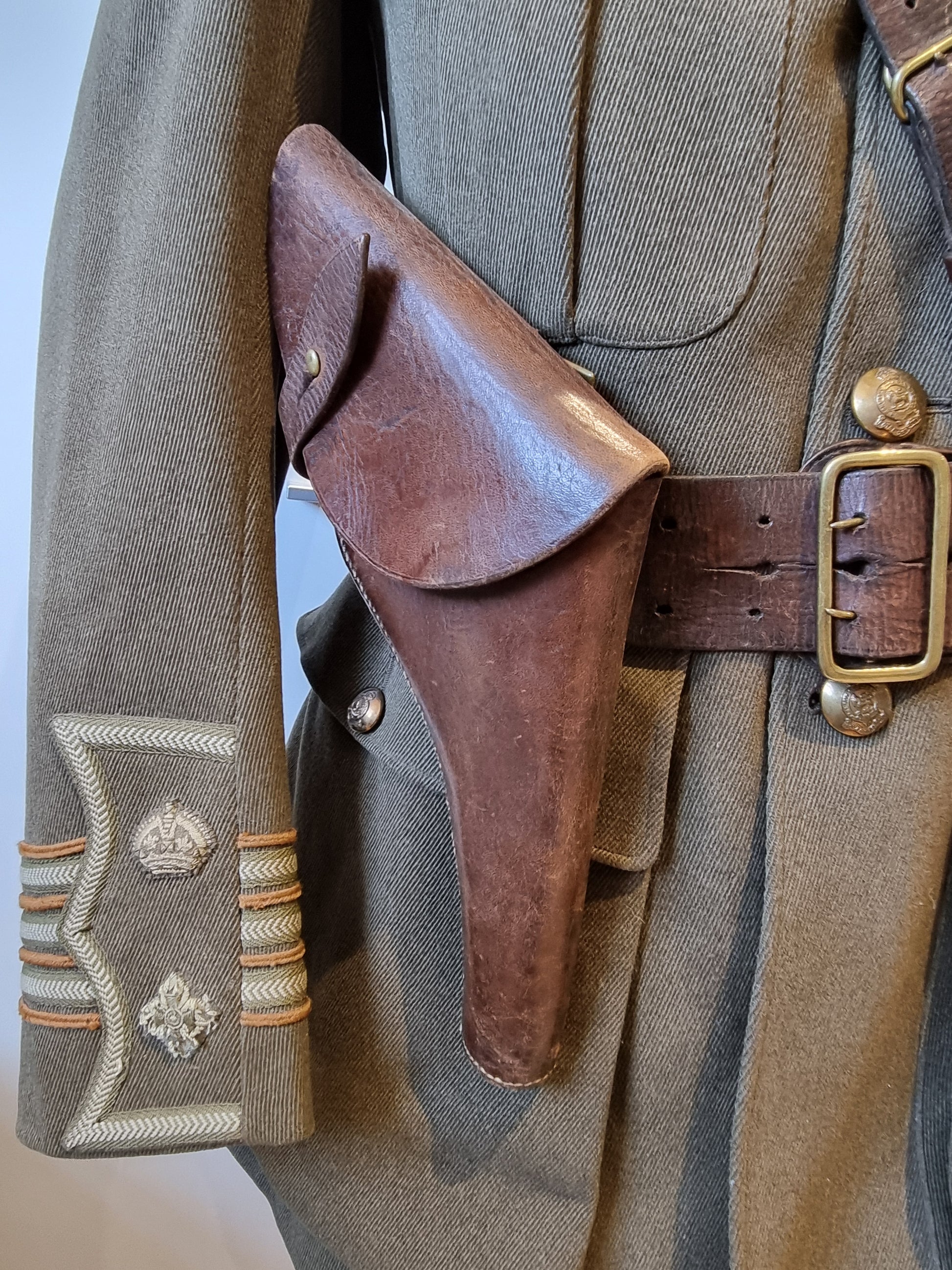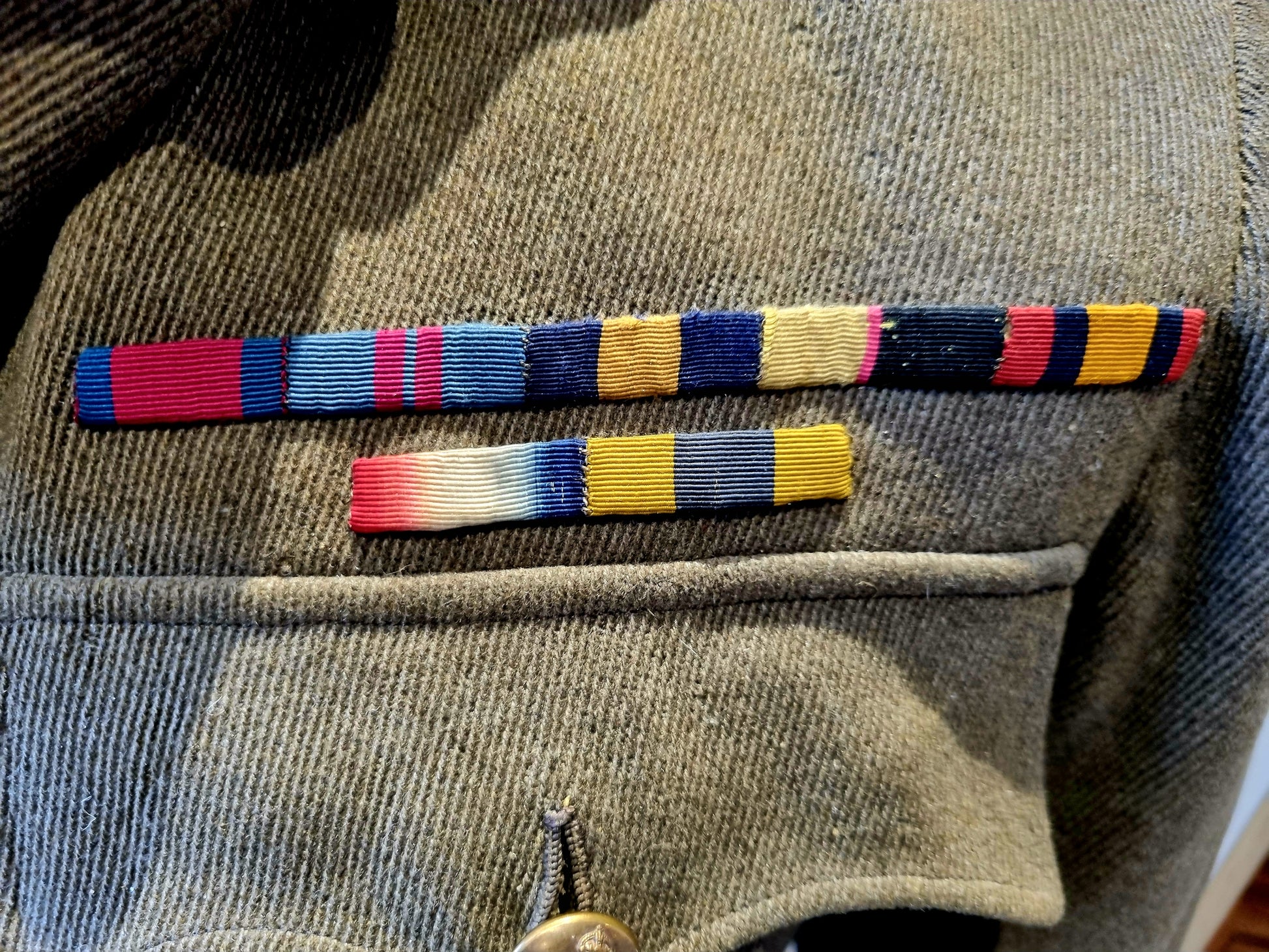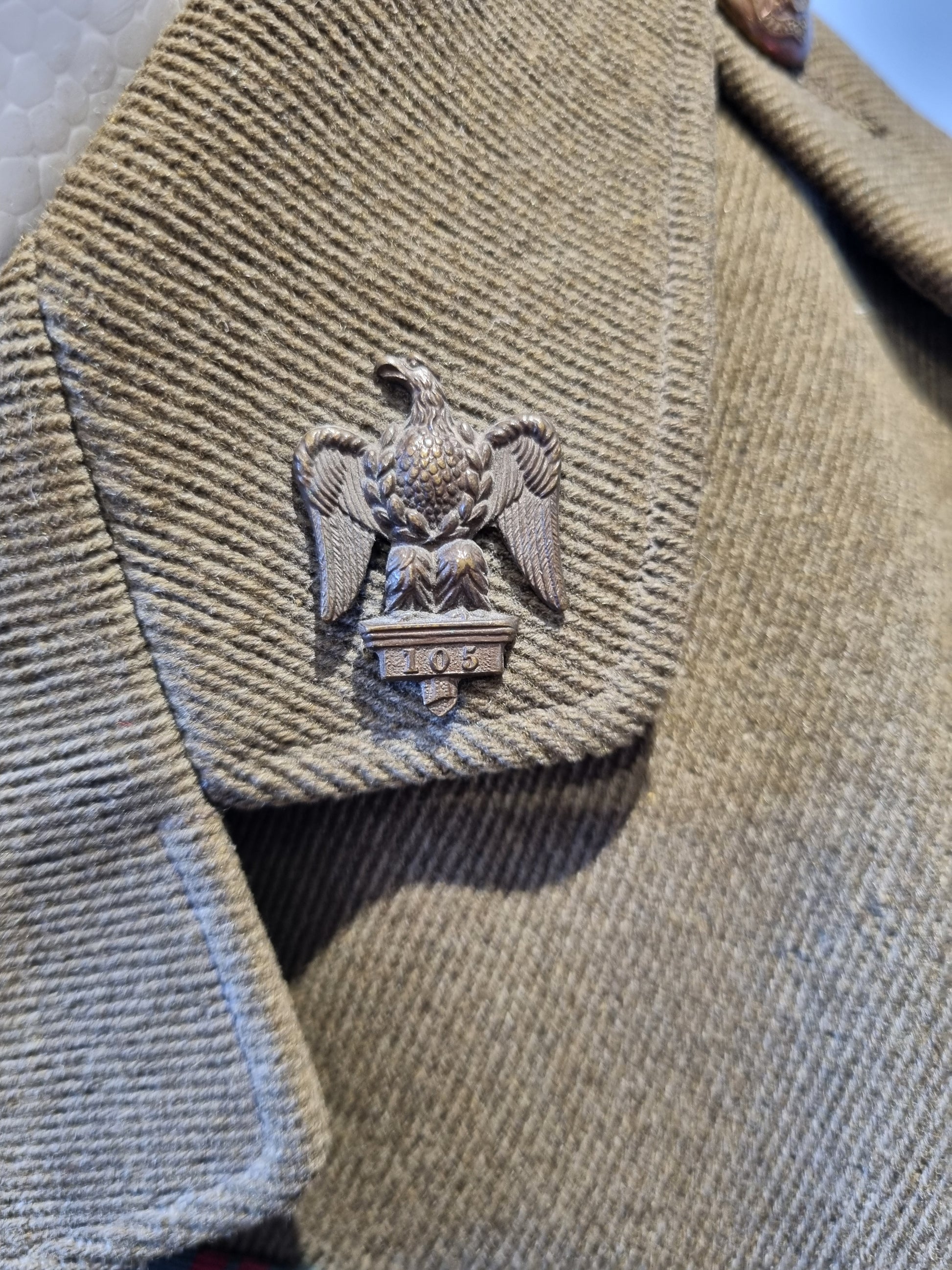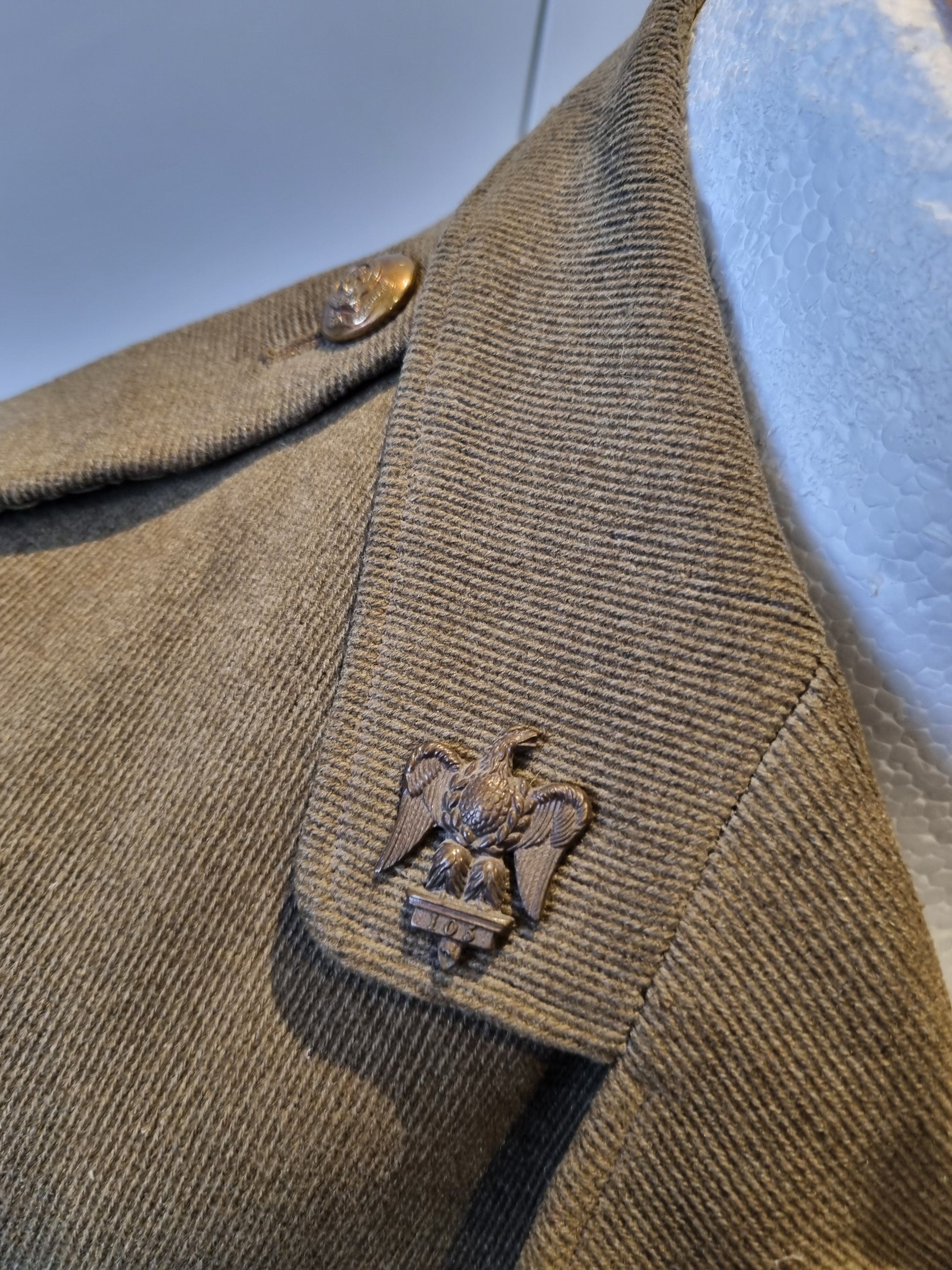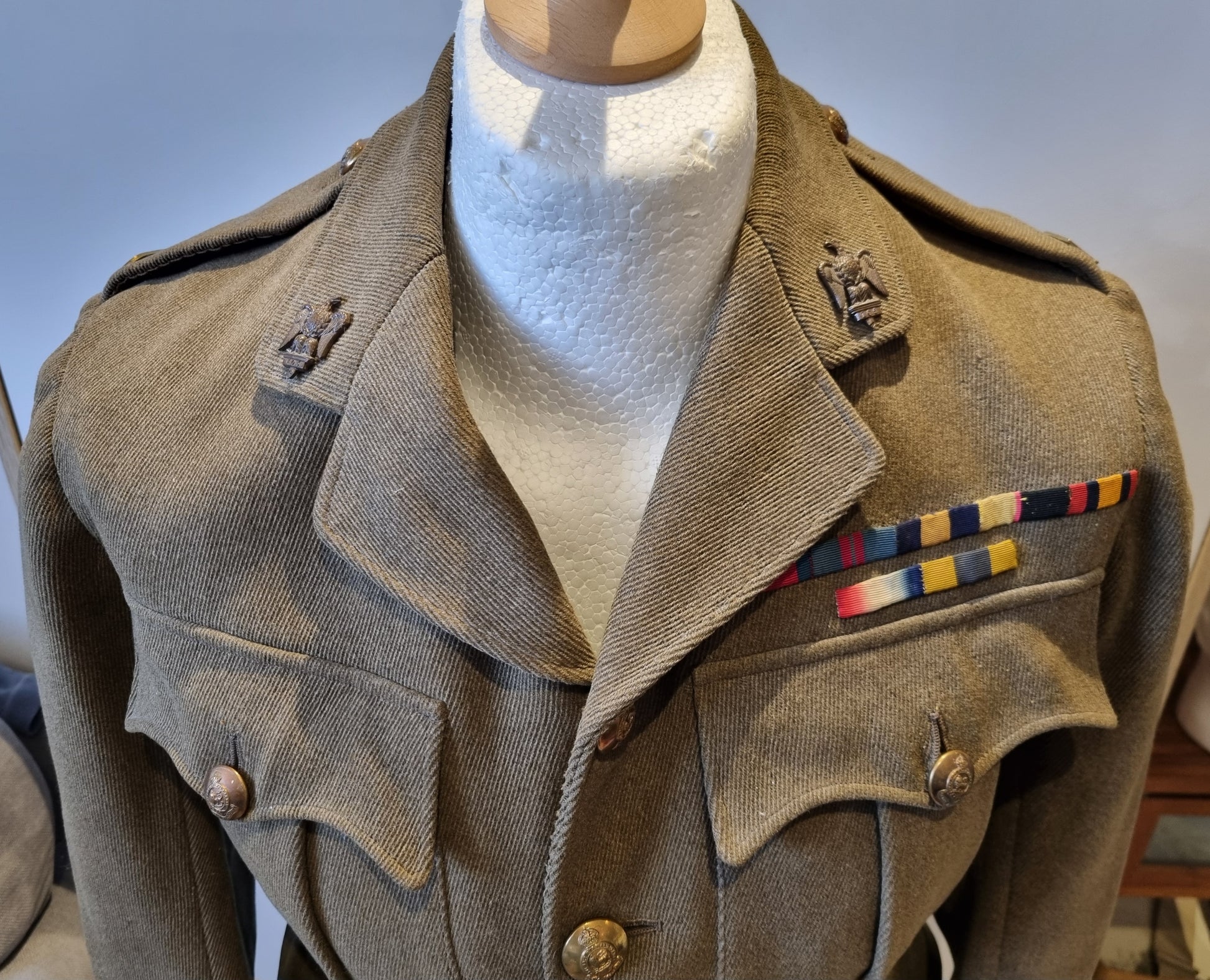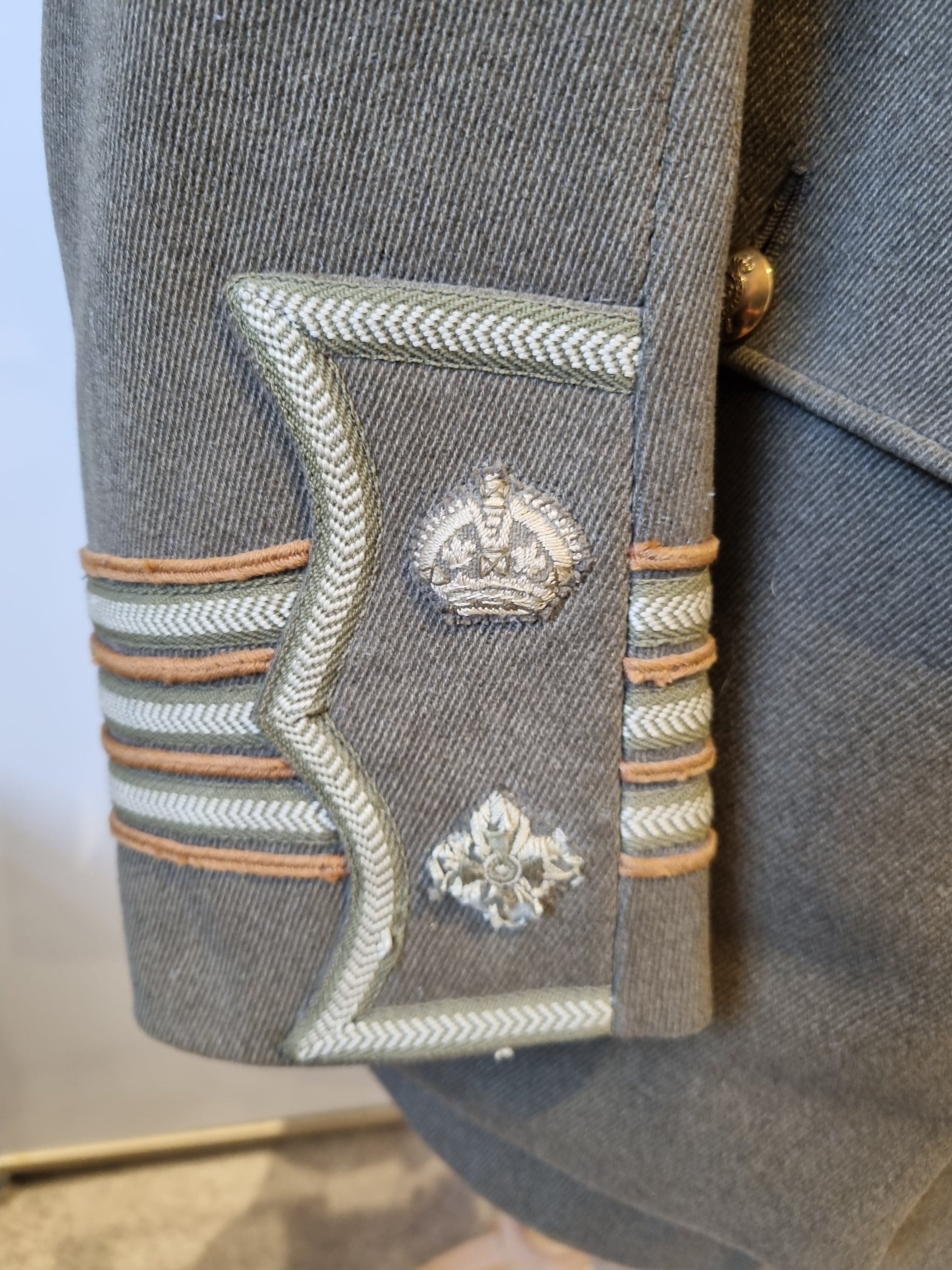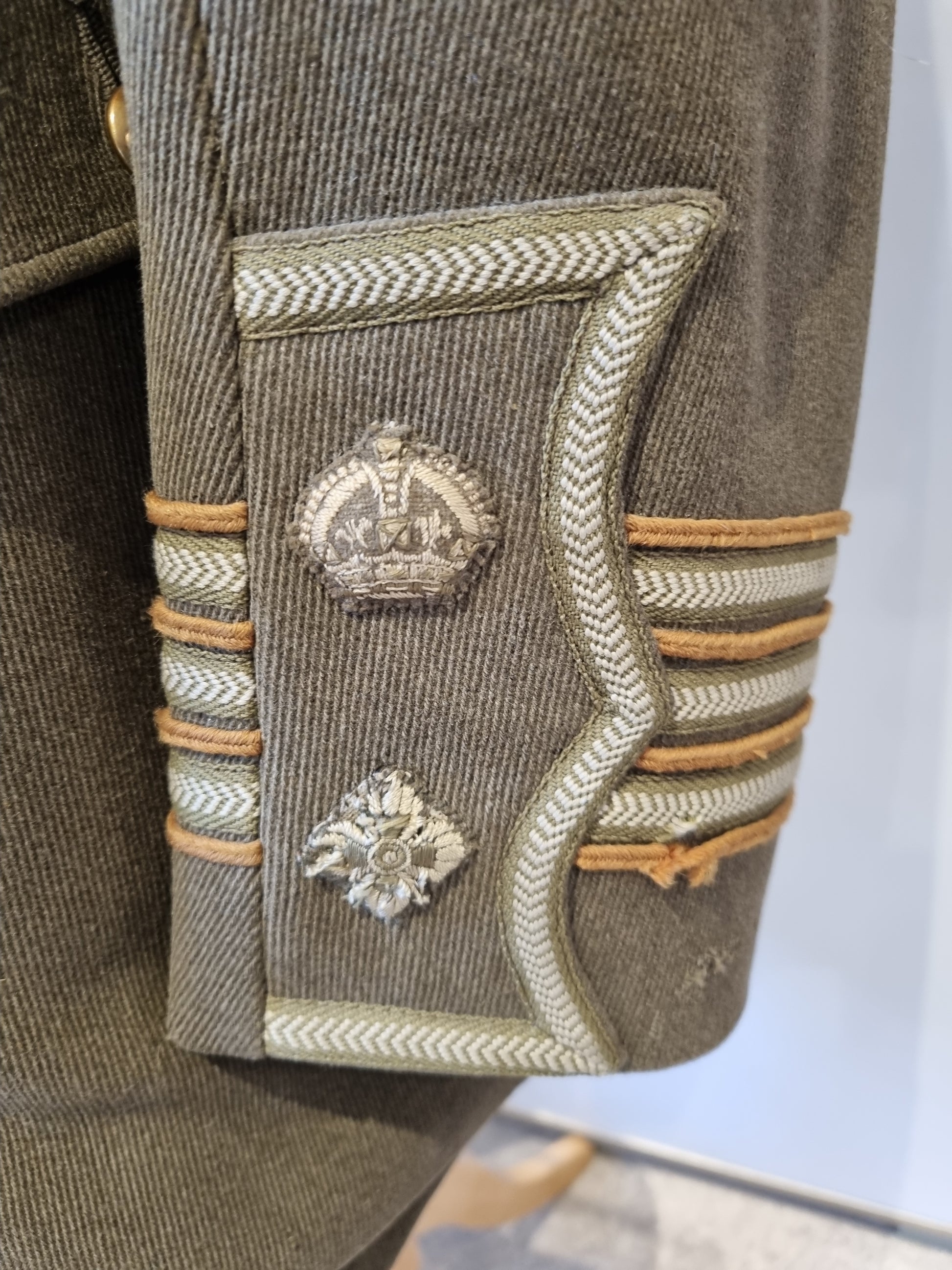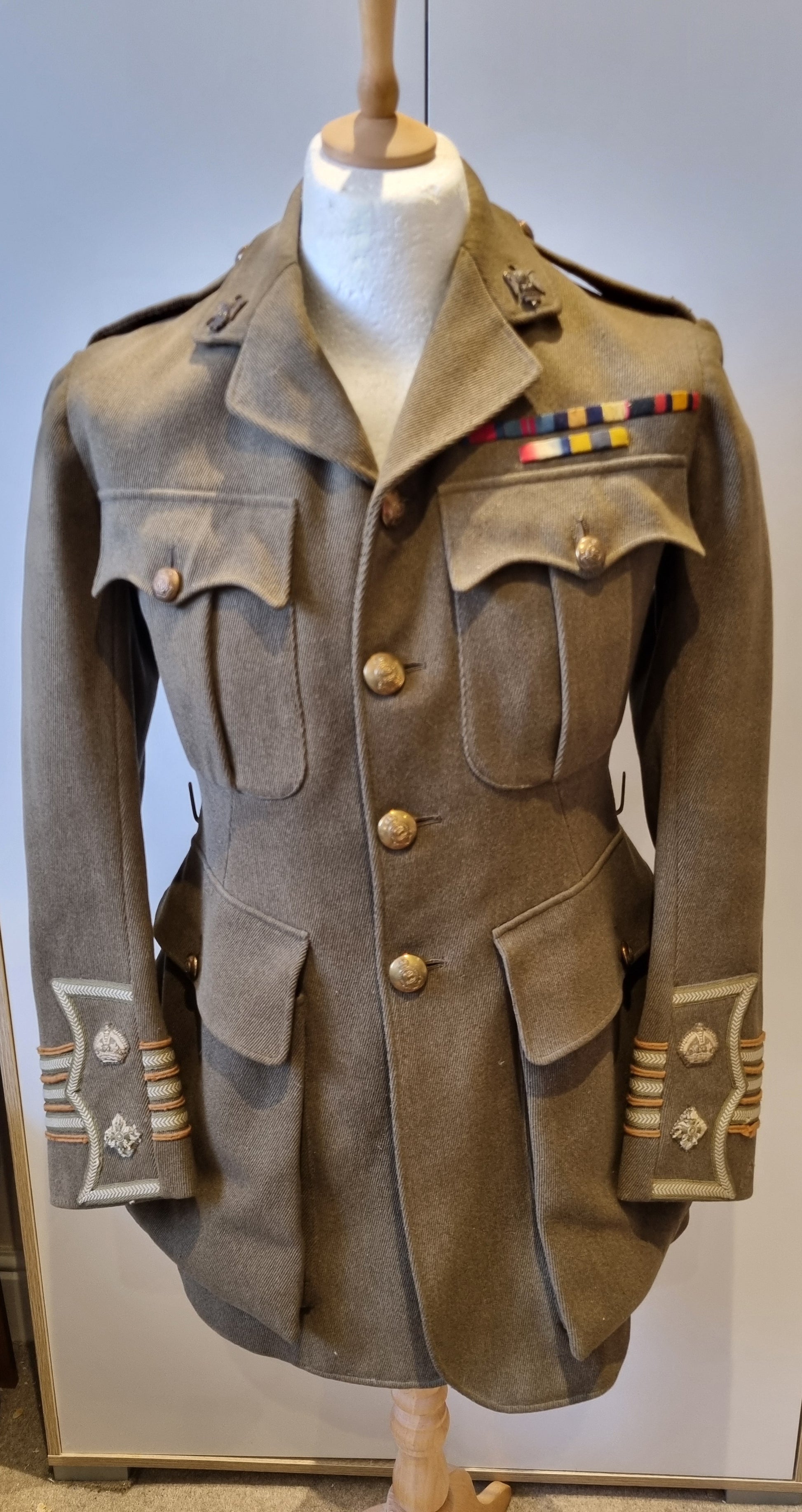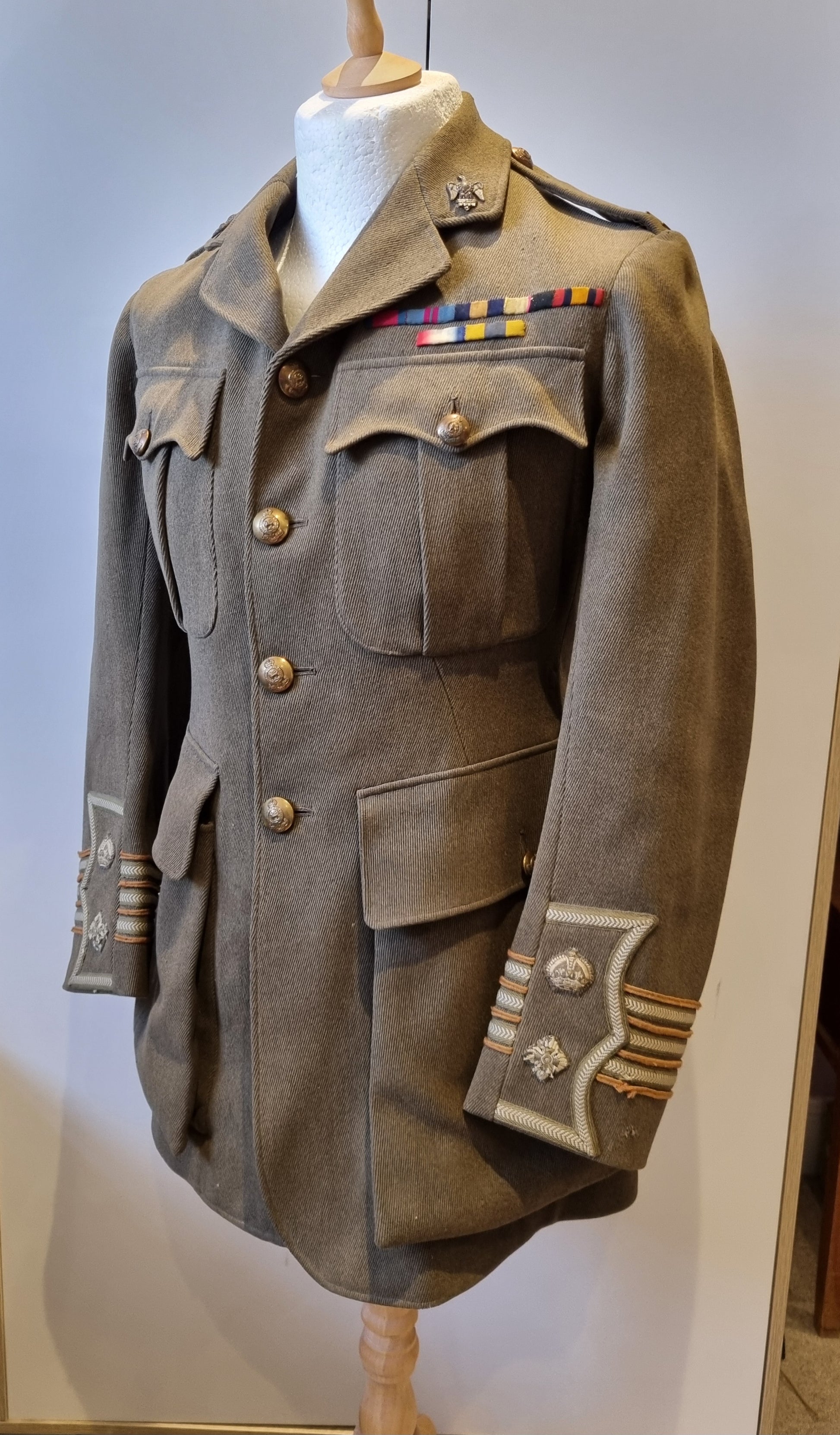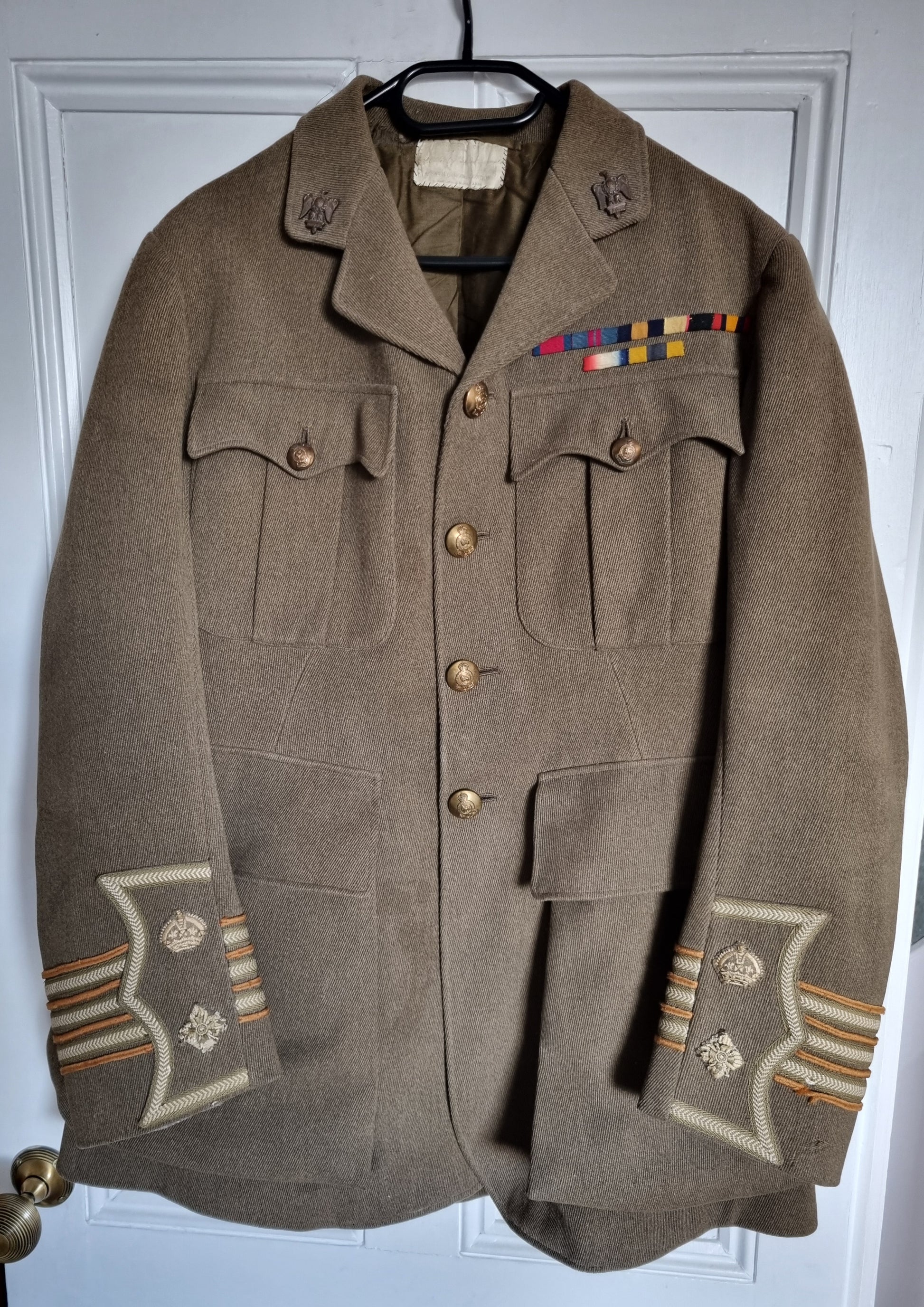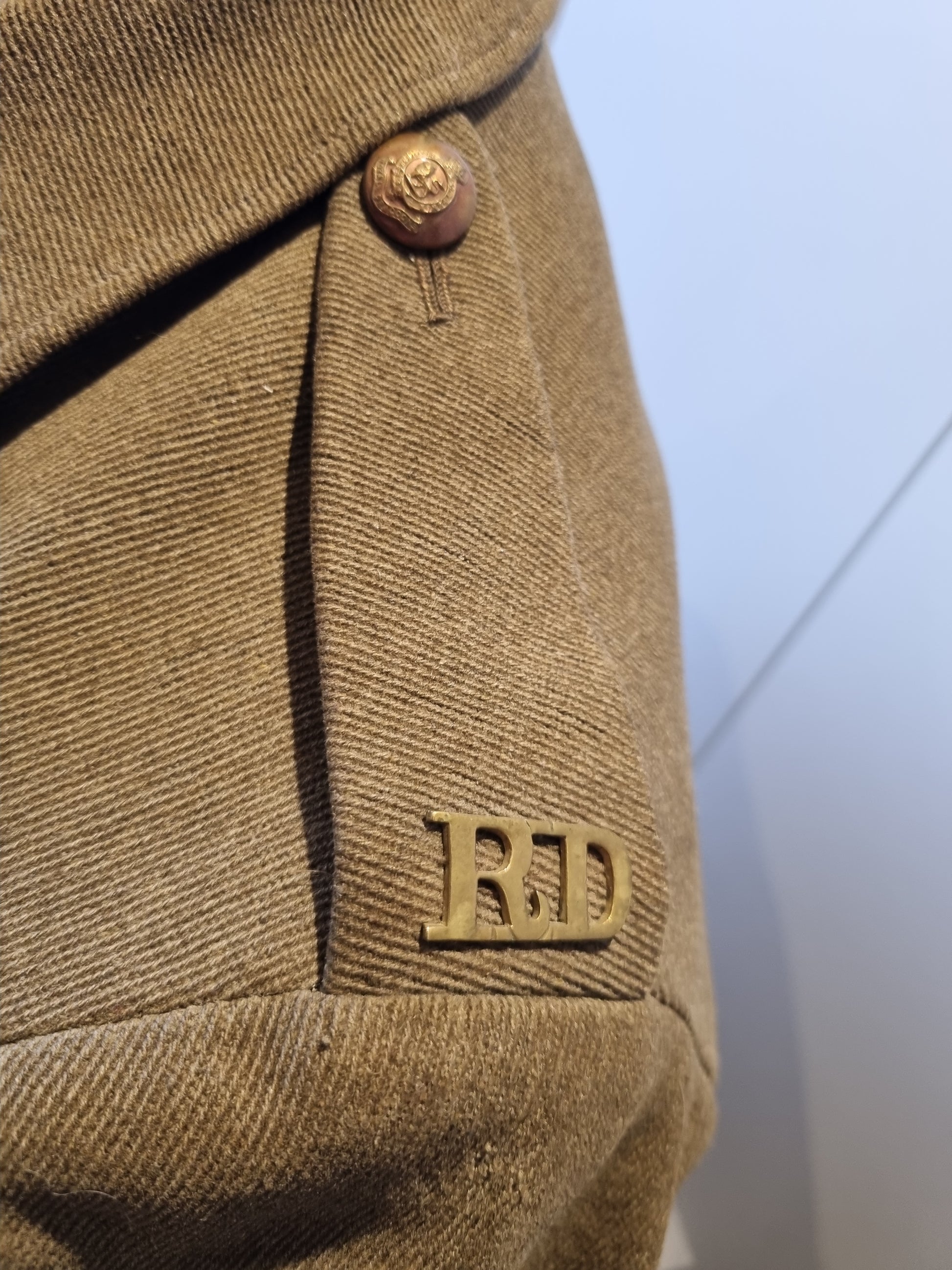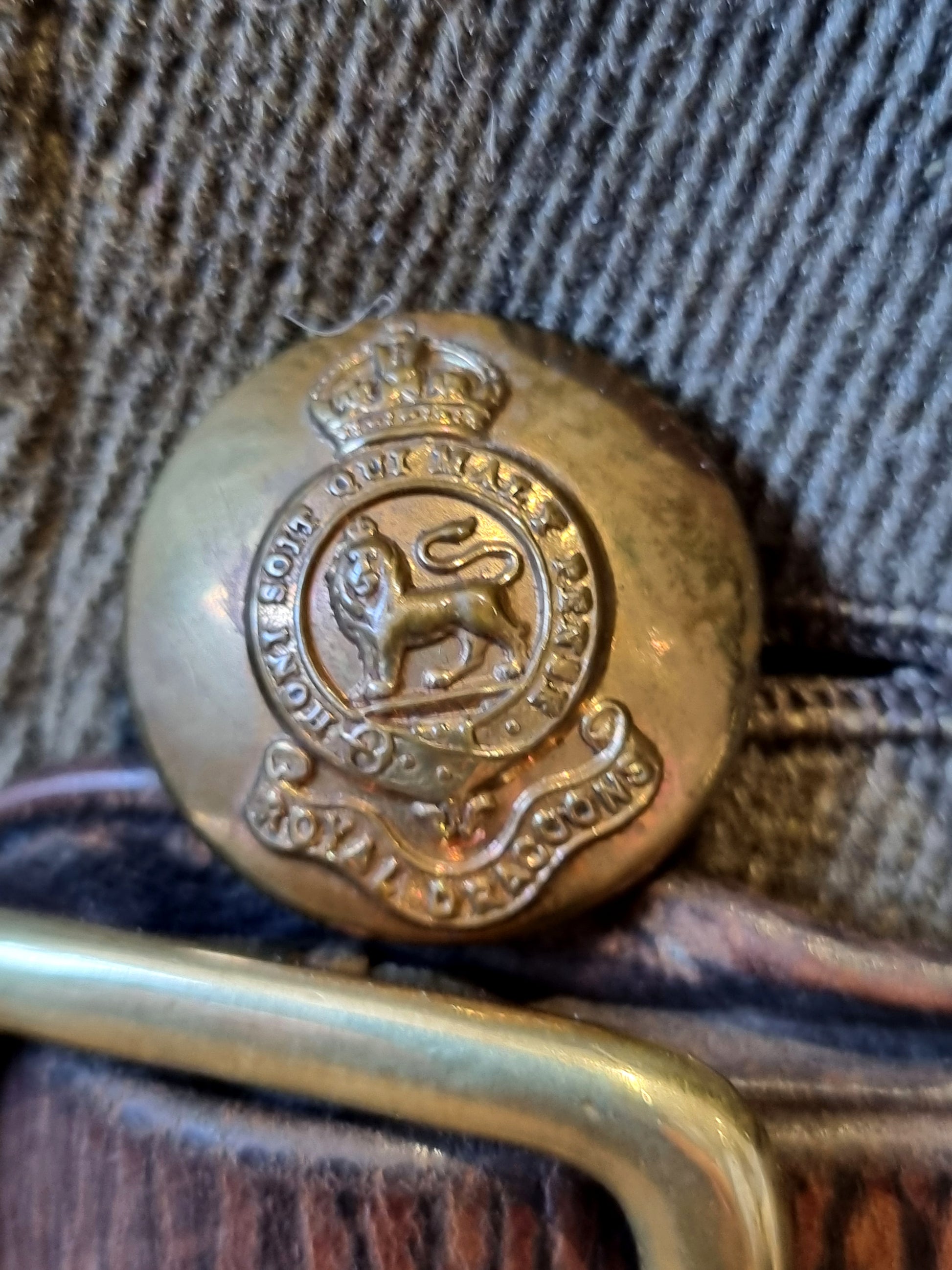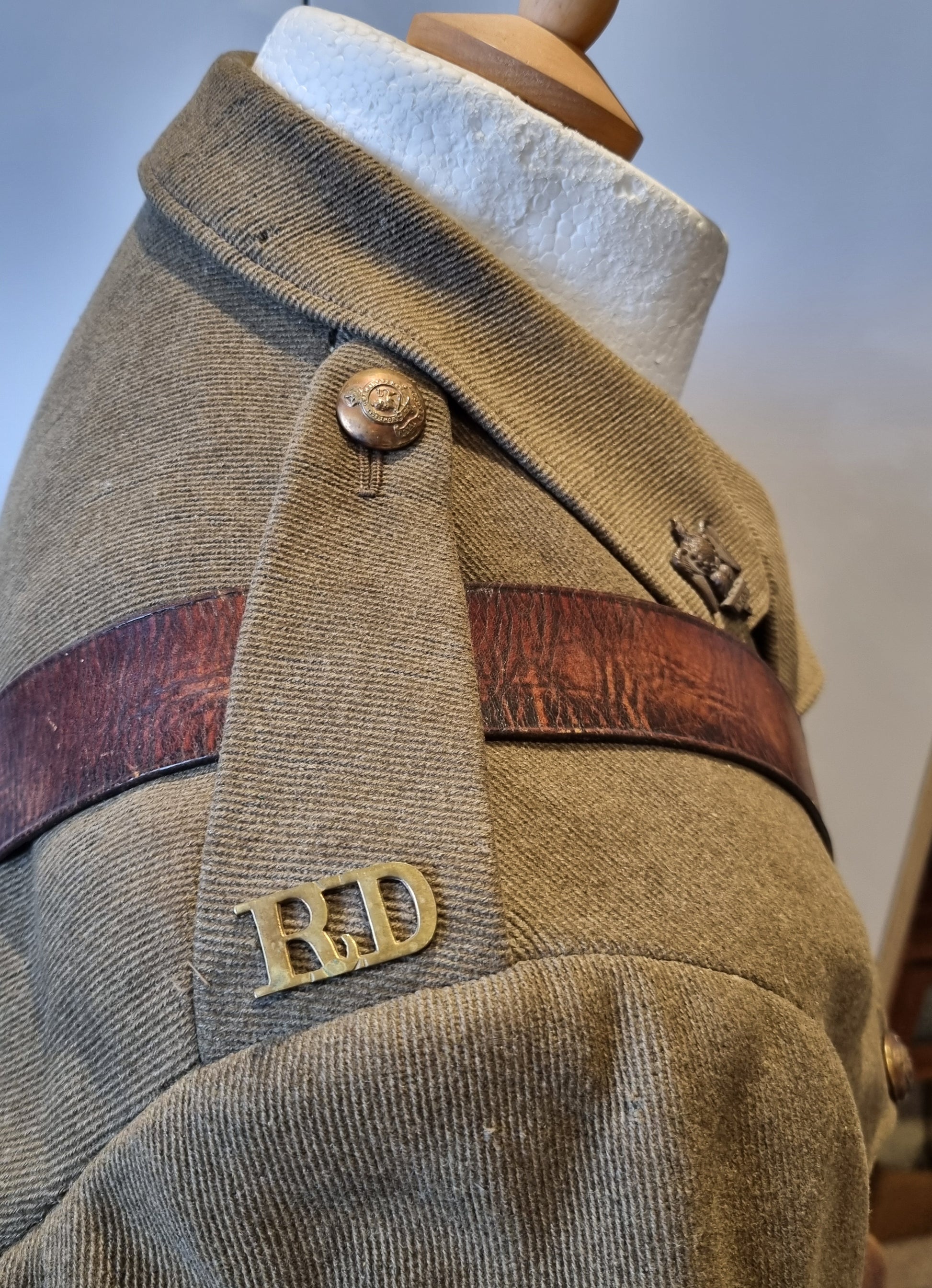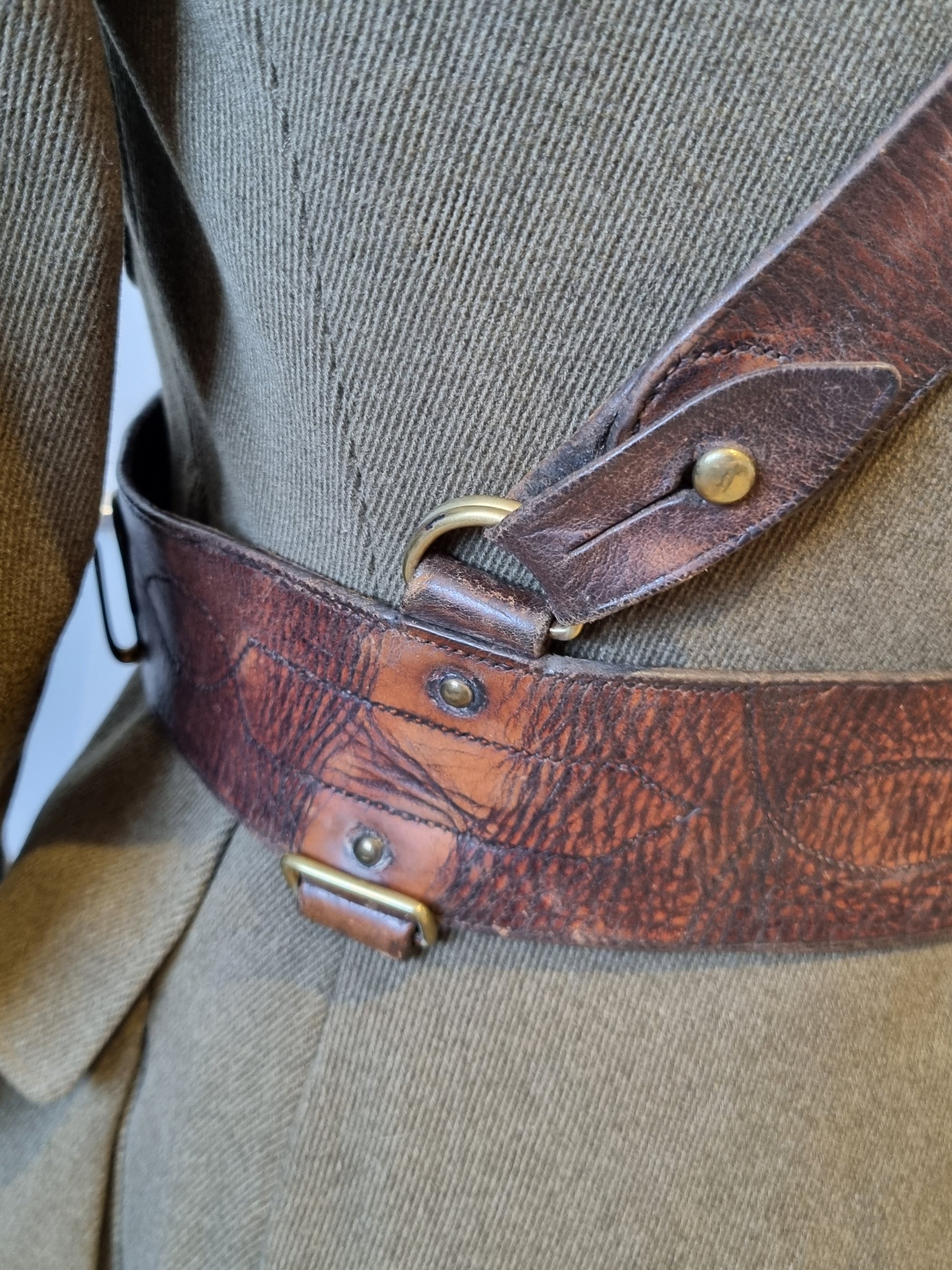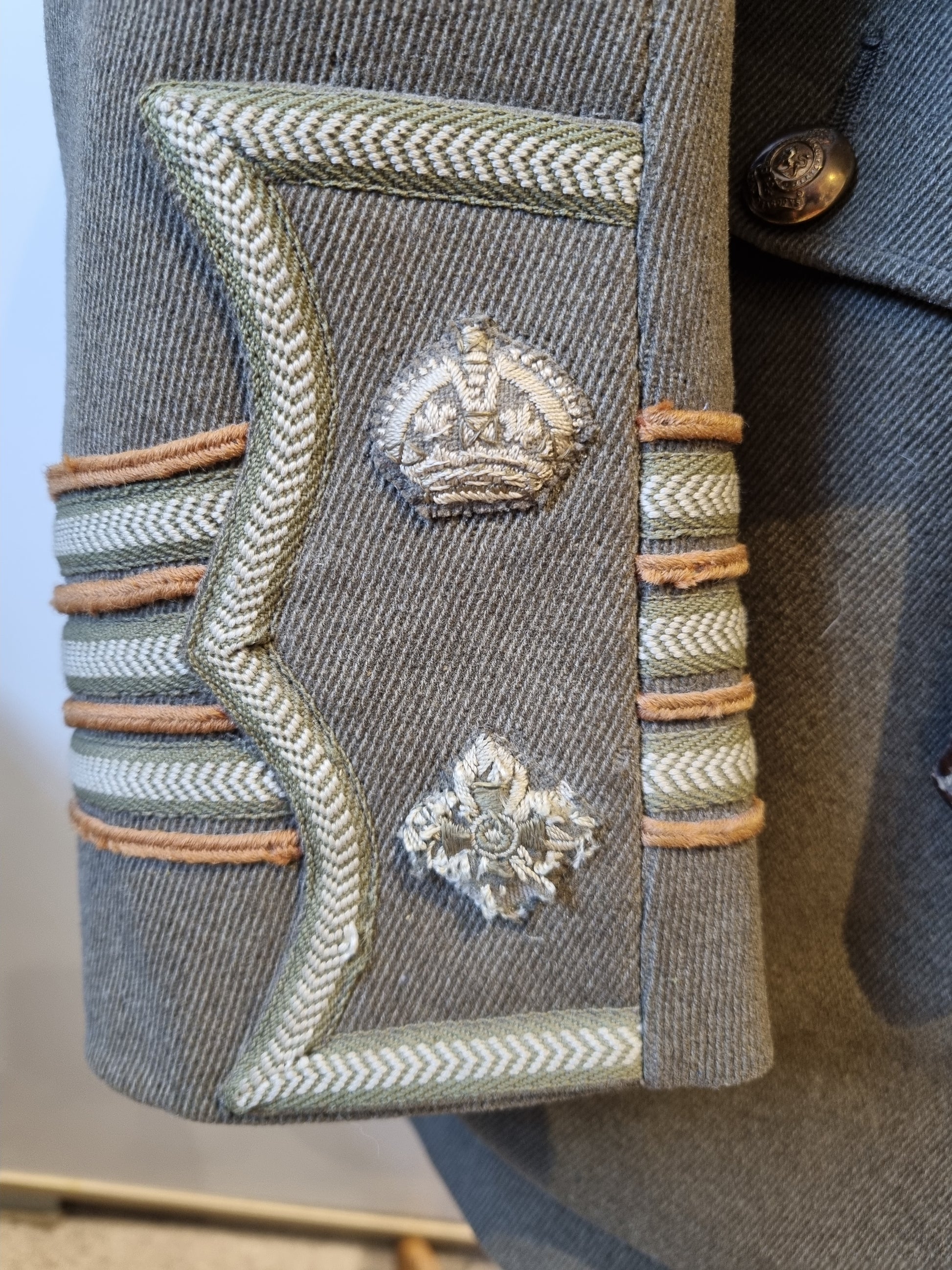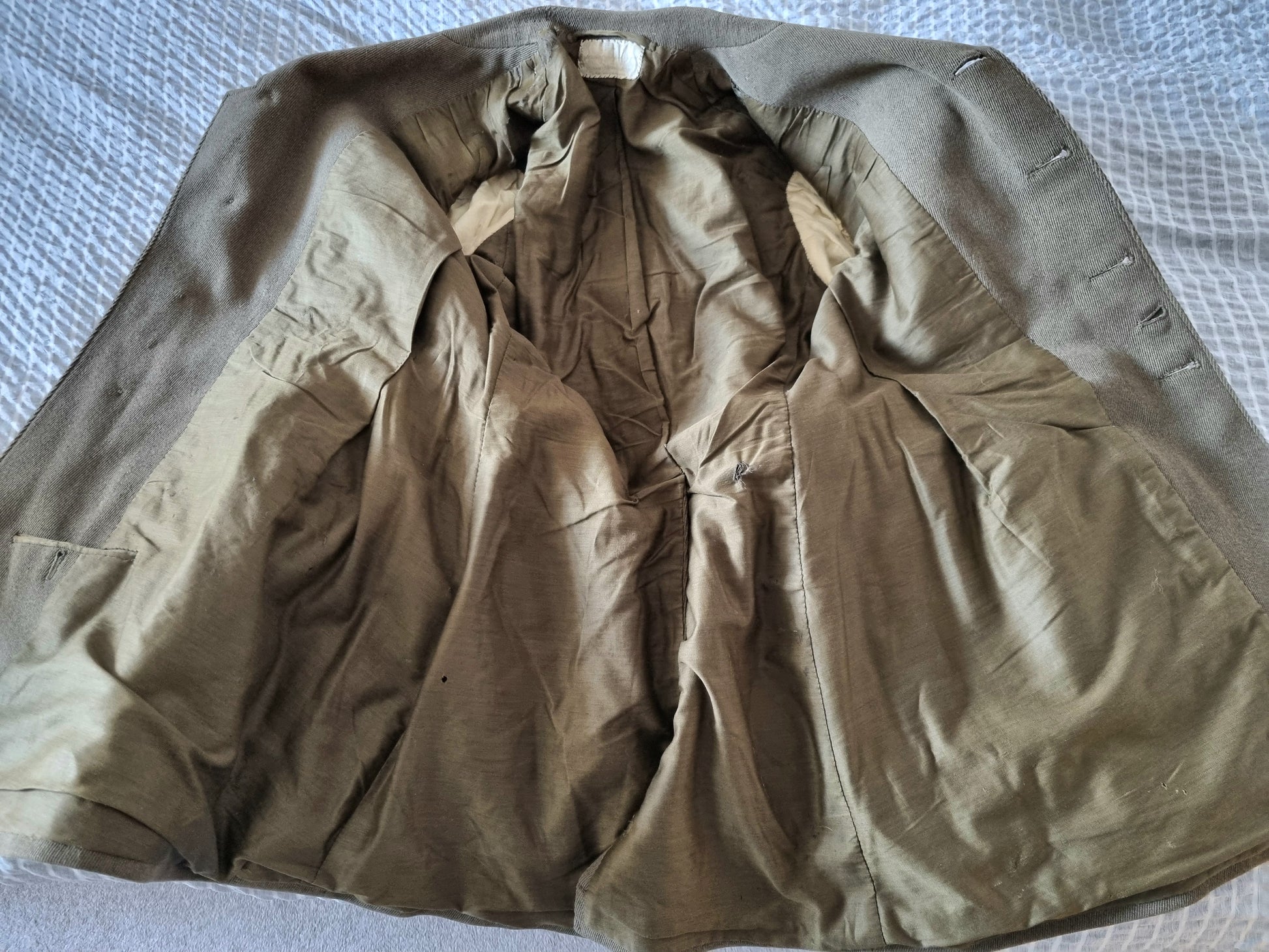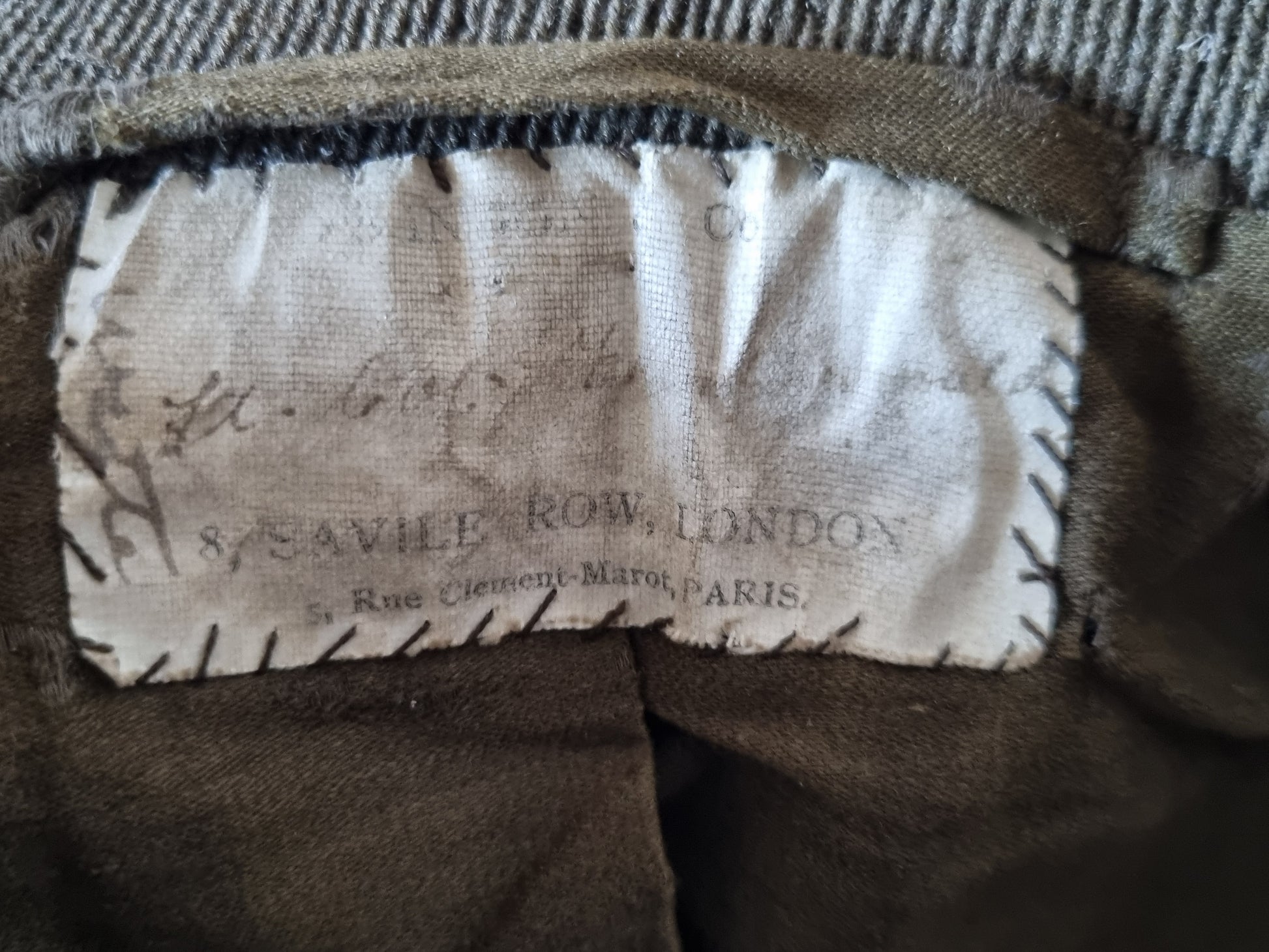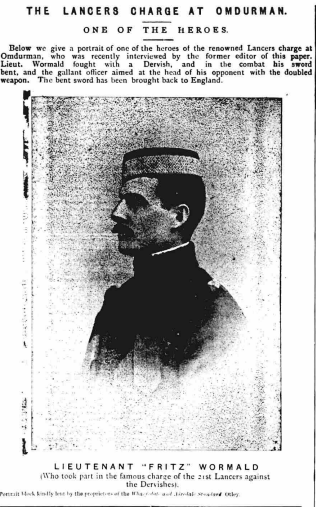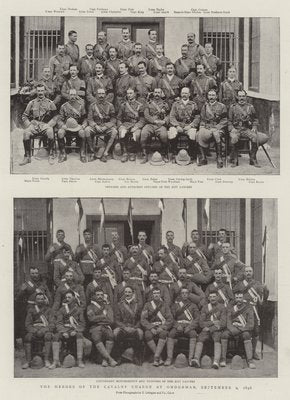SOLD! Unique WW1 Uniform Set of Lt Colonel Frederick Wormald DSO, Commander of Royal Dragoons
SOLD! Unique WW1 Uniform Set of Lt Colonel Frederick Wormald DSO, Commander of Royal Dragoons
Couldn't load pickup availability
A completely unique WW1 cuff rank officers uniform jacket/tunic, Sam Browne belt, and Pistol holster to Lt Colonel Frederick William 'Fritz' Wormald, DSO, commander of the Royal Dragoons Dec 1915- Nov 1918, Hero of the Battle of Omdurman, and Bechuanaland & Boer War veteran. He was also a personal friend of Churchill's, serving with him in the Sudan and appearing in many of his books and writings. His portrait is held by the Imperial War Museum.
The uniform dates from late 1915/early 1916, from Wormald's time in command of the Royal Dragoons.
With dark brass Royal Dragoons collar badges, RD shoulder titles.
All RD buttons present.
With fabric medal bar containing his DSO, Delhi Dhurba Medal, Cape of Good Hope Medal, Queen's Sudan Medal, Queen's South Africa Medal, 1914 Star and Khedive's Sudan Medal.
Condition is excellent with one very small moth hole on the collar and some freying to one of the cuff rank pips, rank banding and cuff
The Sam Browne and holster show a lovely patina to the leather.
Jacket is named to Lt Colonel Wormald on the Saville row makers label, though faintly
The fabric of the jacket is a very high quality thick Twill fabric.
Chest measures approx 38-39. Armpit to cuff is 18 inches.
Displays beautifully.
Supplied with a substantial number of items of research materials, including his official IWM portrait c.1911, a portrait dating from around the time of the Battle of Omdurman and a photo of him and Churchill in 1944.
Wormald was awarded:
- Distinguished Service Order (DSO)- issued 1901
- Cape of Good Hope Service Medal with Bechuanaland Clasp- 1896-7
- Queen’s Sudan Medal 1898
- Khedive’s Sudan Medal 1897, with Khartoum Clasp 1898
- Queen’s South Africa Medal, with 8 clasps: Relief of Kimberley, Paardeburg, Johannesburg, Diamond Hill, Wittebergen,Belfast, South Africa 1901, South Africa 1902
- King’s South Africa Medal
- WW1 1914 Star
- WW1 Victory Medal
- WW1 British War Medal
- Delhi Dhurba Medal 1903/1911
- Mentioned in Dispatches x3 (Sept 1901, June 1916, Dec 1917
Lieutenant Colonel Frederick 'Fritz' William Wormald
He was born 21 June, 1869, the son of John Wormald, of Dewsbury. He was educated at Harrow, alongside his two brothers, John and Frank, where they were all keen polo players, including playing alongside Winston Churchill who was a friend and later comrade of Frederick. He then attended Trinity College Cambridge and joined the 7th Hussars 29 April 1891, becoming Lieutenant on 24 Oct 1894.
His first action was in Bechuanaland 1896-97 (medal and clasp), serving under the 7th Hussars (Bechuanaland Field Force) as Aide de Camp to the Field Force. He is personally mentioned in the ‘Account of the Bechuanaland Rebellion’ by N B Hewitt.
He then served in the Nile Expedition to the Sudan in 1898 (Medal and Khedive’s Medal with clasp) representing the 7th Hussars as part of the 12th Lancers. Here he was reunited with his schoolboy friend, Lieutenant Winston Churchill, who was serving as a subaltern for the 4th Hussars also in the 12th Lancers. The two young Lieutenants were both present during the battle of Khartoum, particularly at Omdurman (2nd September 1898), where Wormald was a key part of one of the British militaries last cavalry charges- 3-400 cavalry (within which Wormald was leading a troop) against up to 2,000 Dervishes armed with swords and rifles. Churchill described the lead up to and events of the battle in his books:
“With two troops thrown out a mile in front we waited watching on the hill. Time passed slowly, for the run was hot. Lieutenant Wormald of the 7th Hussars who was, like me, attached to the 21st Lancers and to this squadron— proceeded to make some excellent soup. He had seen war in South Africa; and as they have few followers or native servants there, the subaltern learns to be handy in all matters of camp and cooking. While he was engaged in this occupation, and I was assisting him by encouraging remarks, it suddenly became evident that one of the advanced troops was signalling energetically. The message was spelt out. The officer with the troop, Lieutenant Smyth, perceived Dervishes in his front…the soup boiled over unattended”- Churchill, The River War and Reconquest of Sudan
“The Dervishes appeared to be ten or twelve deep at the thickest, a great grey mass gleaming with steel, filling the dry watercourse. In the same twinkling of an eye I saw also that our right overlapped their left, that my troop would just strike the edge of their array, and that the troop on my right would charge into air. My subaltern comrade on the right, Wormald of the 7th Hussars, could see the situation too; and we both increased our speed to the very fastest gallop and curved inwards like the horns of the moon. One really had not time to be frightened or to think of anything else but these particular necessary actions which I have described.”- Churchill, My Early Life, A Roving Commission
“I must explain my position. I was right troop leader but one. I saw we overlapped. I was afraid we would charge into air. I shouted to Lieutenant Wormald (an excellent officer) to shoulder, and we actually struck the enemy in a crescent formation. The result of our shoulder was this: my troop struck the nullah diagonally, and their decreasing slope enabled us to gallop through not jump it.”- Churchill, in a letter to Ian Hamilton
“Lieutenant Wormald, of the 7th Hussars, thrust at a man with his sword, and that weapon, by a well-known London maker, bent double and remained thus.”- Churchill, The River War and Reconquest of Sudan
“[following the battle] There the horses were unsaddled and picketed for the night. While we were all busy about this latter task, which the extreme hardness of the soil rendered difficult, I noticed among the horses" hoofs a small dark object. Lieutenant Wormald, whose troop was next to mine, stooped and picked it up. Loosely wrapped up in a little piece of cloth, but otherwise quite naked, there lay a tiny baby only a few hours old, who forthwith began loudly to bewail the misfortunes of the State. The story was simple. The cannonade in the plain; panic in the city ; the return of the defeated warriors ; the flight; the wretched mother struggling to keep up, oppressed with the pains of maternity, falling by the way, and then dragged on by force — since otherwise she could not have left the baby — and hurried away into the deserts of the south. And the baby! He had already lived an adventurous life. The whole regiment had walked over him in column of troops and left him unharmed. He had been bombarded. Now he was a prisoner of war. Yet his captors were more embarrassed than he. We laid him on the ground clear of the horses and continued the business of picketing. Meanwhile his cries passed from lamentation to fury. He was hungry. What was to be done? Perhaps, had there been milk, we might have kept him as a pet, to be brought up with especial care until, like a young tiger cub, he should become vicious and have to be put in a cage. But there was no milk, and we could scarce invite him to share our sausages. While we still debated, who should come out of the darkness but the Dervish who had been shot in the foot? Evidently, he fancied himself a favourite, since he had not been killed, and meant to take advantage of his position. Here was one solution of the difficulty. We put the baby, still protesting, in the Arab's arms, and, giving him a few ration biscuits, bade him go. Much astonished, and by no means pleased, he departed and disappeared in the night ; and I have wondered since what happened to the baby.”- Churchill, The River War and Reconquest of Sudan
Other papers also noted Wormald’s bravery in the battle, particularly his duel with the Emir. He was even granted a fairly sizeable front page feature in his hometown newspaper, the Dewsbury reporter, 15/08/1898, which I am unable to type out in full, but as a taster:
“Lieut ‘Fritz’ Wormald’s Graphic Account of the Lancers Charge at Omdurman: The famous charge of the 21st Lancers at the battle of Omdurman was the most dramatic incident in the campaign…The charge will rank amongst the great heroic deeds performed by soldiers of the Queen. The fact is that not only was a Yorkshireman there, but an officer from this district, in the person of Lieutenant Frederick William Wormald, son of Mr John Wormald of Denton Park, and of the great firm of blanket makers, Wormald and Walker. ‘Fritz’ as he is familiarly called amongst his friends- with whom he is very popular- was one of the gallant 300 who assailed a body of about 2,000 fighting dervishes, was the hero of an exciting adventure, and although having a hairbreadth escape, came out without a scratch. Upon his return home last Monday night, he had a cordial greeting at the hands of relatives and friends, and early on Tuesday morning we had the pleasure of an interview with the gallant young officer- we say young advisedly for he is only 28. Whilst he has the military carriage, he is unassuming, and there is an entire absence of bombard. He has been fortunate to be in the historic charge; he went to do his duty, did it, and thinks there is nothing grandiose about it. There was no wish to magnify the role he played, but rather to belittle it…We suggested that some description of his experiences would be of interest…regretting that he was not much of a hand at picture painting, he commenced…. Wormald belongs to the 7th Hussars and was at home on leave when he heard of the organisation of the Sudan Expedition…he wished to be at the front and take part in the fighting. He at once volunteered for service and seeing that nearly all the subalterns of the British Cavalry did the same, he esteems himself lucky to be one of the four selected. The 21st Lancers had lost some of their officers and he was attached to their regiment. He joined the Lancers at Cairo, and after waiting there a few days, they continued the journey to Omdurman…they proceeded by rail and steamboat down the Nile as far as Atbara. The heat being intense- considerably over 100 degrees in the shade- they had to march early in the day. The Lancers joined the main army at Wad Hamed….at last the eventful 2nd September arrived…They noticed in a nullah what appeared to be a small body of the enemy…they deployed into line for attack and charged at the gallop. When they got within two or three hundred yards…they discovered that instead of a mere handful of men, there were about 1500, armed with rifles and swords and waiting to receive them. The odds were overwhelming…there was nothing else for it but to ‘go right at them…pressed as to his own part in the memorable conflict, Wormald said he was leading a troop of Lancers on the right flank…as they came over the nullah he saw a Dervish making off and saying to himself " I'll have a go at this fellow,"' he started after him. The Dervish was mounted on an Arab horse which, however, was in a bad condition. and riding on a sturdy English pony, the Lieutenant soon gained on him. Seeing he was hotly pursued. the Dervish turned round and fired his rifle at him, Whether the shot came near Wormald did not know: the only thing he knew was that he was not hit and he got up to the warrior. When near enough, he delivered a sword point at his back with his sword, but to his dismay the sword bent, and was almost useless. This would have been a critical, probably a fatal moment, if the Dervish had turned to fight: but he was desperately bent on getting away. Lieut. Wormald aimed at his head with the doubled weapon and then, being a leader of his troop, returned to his men…the young officer speaks with little contempt about the untrustworthy blade….That blade however, has been brought home to England, it will be a trophy, possibly an heirloom. Since his return to British soil he has seen messrs Wilkinson, who make nearly all the models for officers of the army. They are putting in a new blade, and own themselves that the steel was soft. With regard to the enemy, he spoke of them as born fighters and brave men who have not the slightest fear of death”.
The incident was even reported as far afield as Australia, and back in his home town, he was granted a whole front page interview.
“Lieutenant Wormald, of the 7th Hussars, engaged an emir single handed and nearly came to grief. Delivering a terrific blow at the mail-clad warrior, the lieutenant's sword, striking against the chain armour, bent double as though it wore lead, but before the emir could gut his own sword home, Wormald hit him across the head with the bent sword and stunned him, and a lancer opportunely coming along finished the chieftain.”- South Australian Register, 10th October 1898
After this infamous incident, the Wilkinson Sword Company honoured their guarantee by presenting Wormald with a new sword.
He then fought in the Boer War (Kings and Queens medal, 8 bars, DSO, MiD), being promoted Captain on the 30th December 1899 serving as Aide de Camp to Major-General, Cavalry Brigade until 10th February 1900, then as Aide de Camp to Brigadier-General, Cavalry Brigade, until 31st October 1900.
During the Boer War he took part in both the advance on and Relief of Kimberley. Followed by operations in the Orange Free State, from Feb to May 1900, including operations at Paardeberg, Poplar Grove, Karee Siding and Zand River. He then took part in operations in the Transvaal May to June, 1900, including actions near Johannesburg, Pretoria and Diamond Hill. Then operations in the Transvaal, east of Pretoria, July to Nov. 1900, including action at Belfast. Operations in Orange River Colony, May to Nov 1900, including actions at Wittebergen. He was then promoted to Adjutant for the 7th Hussars, and returned home on leave for a short time, where parties were held in his village to celebrate his arrival, as recorded in the Batley Reporter and Guardian - Friday 02 November 1900 in an article too long to include in full:
“On Wednesday evening the picturesque little villages of Ben Rhydding and Deaton…were thrown into unusual although pardonable enthusiasm. The occasion was the homecoming of Captain Fritz William Wormald of the 7th Hussars, one of the three gallant sons of Mr and Mrs J Wormald…of the three soldier sons…the inhabitants of Deaton, Dewsbury and Ben Rhydding are justly proud. But it is Fritz who is the more popular and better known of the three for was he not one of the heroes of Omdurman?...Captain Wormald and his brother Frank were among the first to embark for the seat of war, starting in October last year. They have both been in the first fighting line throughout the campaign and were attached to General French’s flying column to Kimberley. Followers of events in South Africa will recognise that both young officers as members of the cavalry brigade have had plenty of rough work to do…Captain Fritz has acted on the staff of General Babington and has also had the honour of being ADC to General Gordon. His ability as a British officer and his valour in the field have been so recognised by the military authorities that he has been asked and has accepted the invitation to become adjutant to his regiment…In health and appearance his 12 months campaigning has altered him but little. He looks pale and hearty, and his fine figure seems sturdier and more closely knit than when he sailed for the Cape… Captain Fritz arrived in England on Sunday…and on reaching the brow of the hill near the vicarage…was met by the Ilkley brass band and the whole of the inhabitants of the village and many from the surrounding townships. The carriage was escorted beneath a triumphal arch which was surmounted by a crown of two stars consisting of fairy lamps and a profusion of Chinese lanterns which had a particular effect in the growing darkness. In the immediate vicinity of the arch the ladies and school children presented the gallant captain with the following address which was read by the vicar: ‘We, the inhabitants of Deaton, desire to offer you our most hearty congratulations on your happy and safe return from the war in South Africa. We have followed with a deep and prayerful interest in the heroic career of yourself and your gallant brothers all through the hard campaign. We have not failed to observe that you have been among the foremost in the fighting line from the commencement to the end of the war. As your immediate neighbours as well as your fellow citizens, we are justly proud of your gallant conduct in the face of a formidable foe and under circumstance of extreme difficulty and danger. Like a true patriot and British soldier you have won distinction for yourself and honour for your Queen and country. Now we are mindful of the fact this is the second great campaign in which you have upheld the glory of the British flag and maintained the best and highest traditions of the British Army. We rejoice most heartily that in the good providence of God you have been spared through all the perils of the war and are restored to your home and friends in health and safety.’…the children then sang the national anthem….and parotic songs such as ‘see the conquering hero comes’. Both Captain Wormald and his father addressed the vast crowd…and thanked them for their display of good feeling. A bonfire was lighted…and a number of shots were fired from a gun brought from Ilkley.”
Wormald then went back to South Africa, serving in Operations in Cape Colony December 1901 to January 1902. He then took part in operations in the Orange River Colony again January to March (and again in May) 1902, followed by operations in the Transvaal March to May 1902. In one particular instance near Tiger’s Kloof Drive in March 1902 “a patrol under Capt Wormold captured 11 Boers and killed one when they were surprised in a cattle kraal near Grootfontein.“
He was mentioned in Despatches [London Gazette 10 Sept 1901] and was awarded the Distinguished Service Order for his service during the Boer War [London Gazette, 27 Sept 1901] and was invested personally by the King on 29 Oct 1901.
He continued to serve as Adjutant to the 7th Hussars, until 31 Oct 1904, before being promoted to Major on 10 February 1906 and posted to the 8th (King’s Royal Irish) Hussars. He was then an instructor at Cavalry School 1906-1910. In 1909 he married Evylyn Christina, daughter of T. H. Cardwell, of Newnton House, Tetbury.
During WW1 (1914 Star, Victory Medal, he transferred back to the 8th (King’s Royal Irish) Hussars as Major, seeing action in the Battle of Givenchy in December 1914 and the 2nd Battle of Ypres in May 1915. On the 21st December 1915, he was promoted to Lieutenant Colonel and put in command of the Royal Dragoons, a position which he held until the end of the war. He led the Royal Dragoons, through the battles of Arras (including the battles of the Scarpe), St Quentin, Avre, Amiens, Cambrai, the retreat from the Hindenburg line and pursuit to the Selle. He even personally led his troops as dismounted foot soldiers in the trenches several times, particularly in 1916. He is mentioned several times in the History of the 6th Cavalry Brigade 1914-18, J. B. Bickersteth. His duties in this role also included informing parents of the death of his soldiers, including notably that of 2nd Lieutenant John Spencer Dunville, VC.
He was mentioned in despatches 13th June 1916 and again on 7th December 1917.
In Feb 1920 he retired, becoming the District Remount Officer in the Remount Service. His portrait is held by the Imperial War Museum. He also remained friends with Churchill, being pictured with him in 1944 with the caption; During his tour the Prime Minister met an old friend, Colonel Wormald, who was a fellow officer in the 21st Lancers. They had a chat over old times. 31/3/44.
Share
